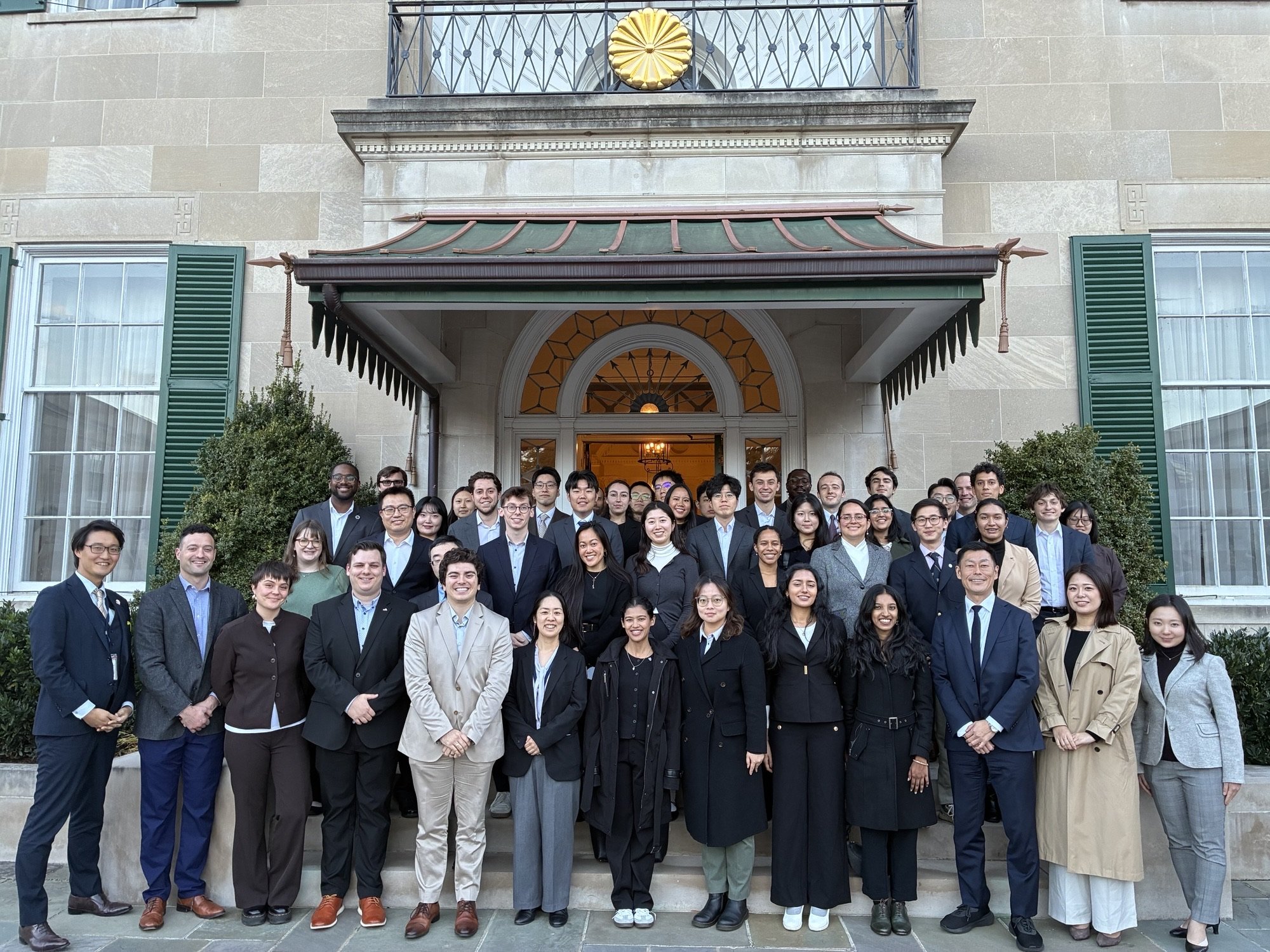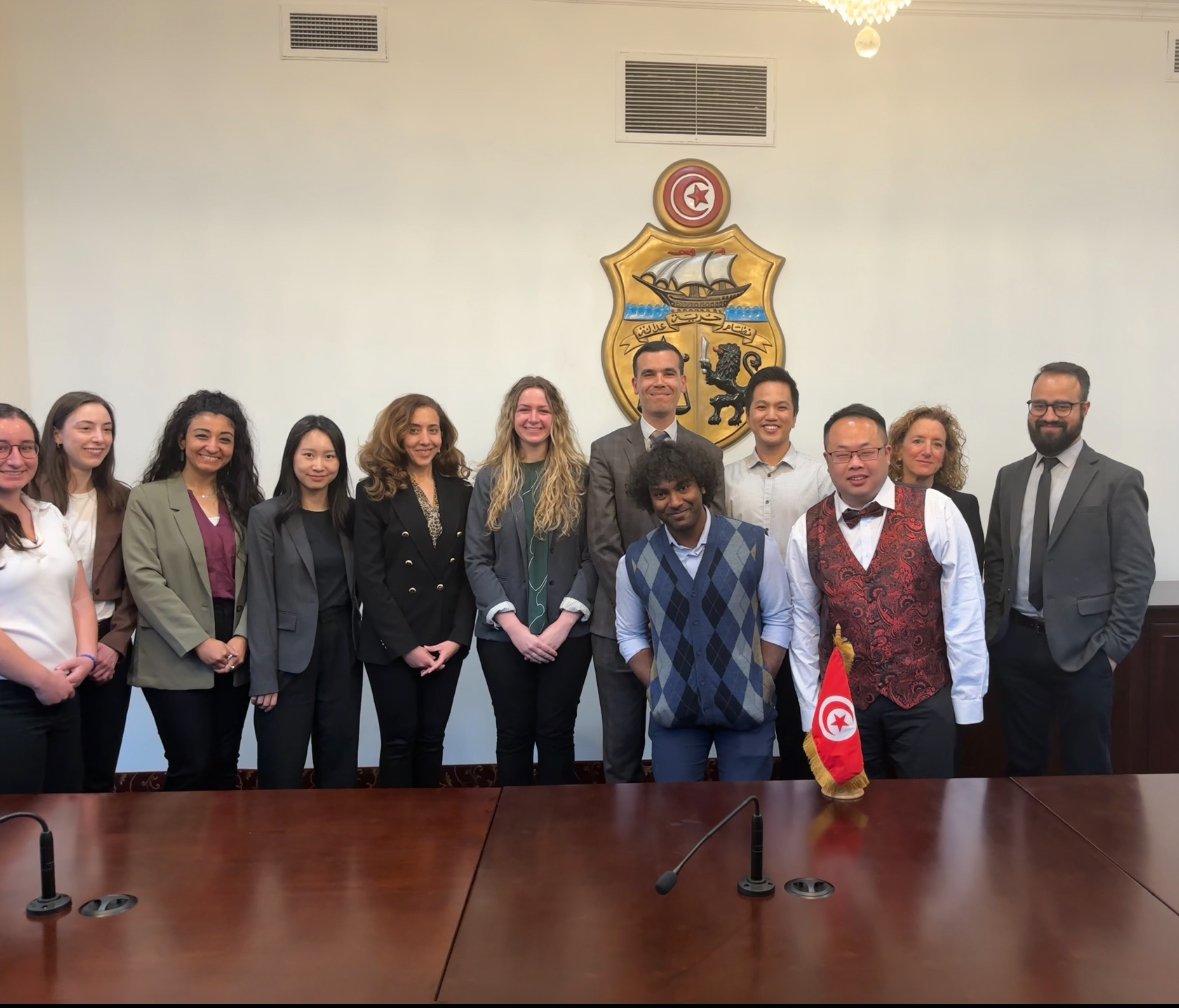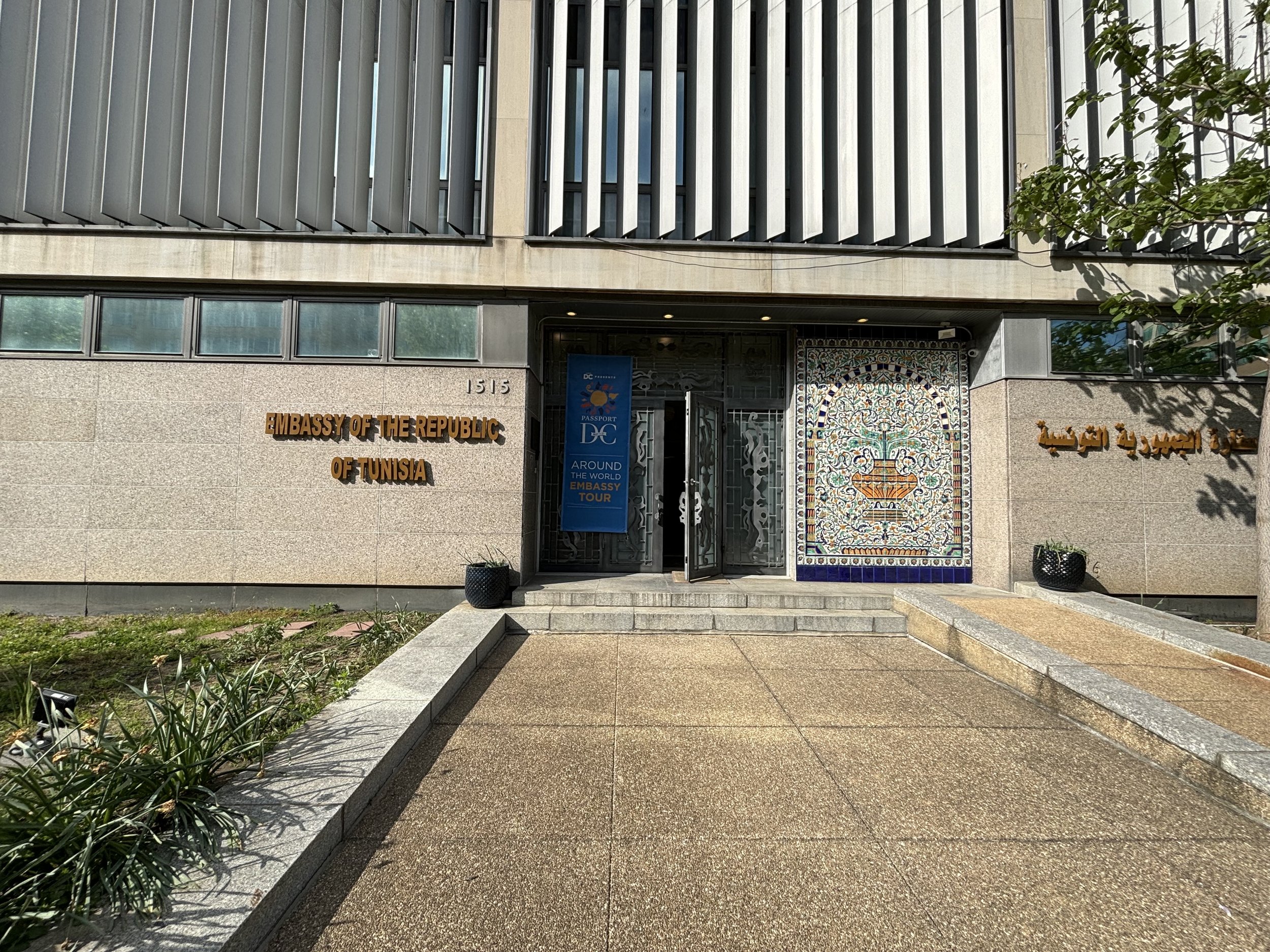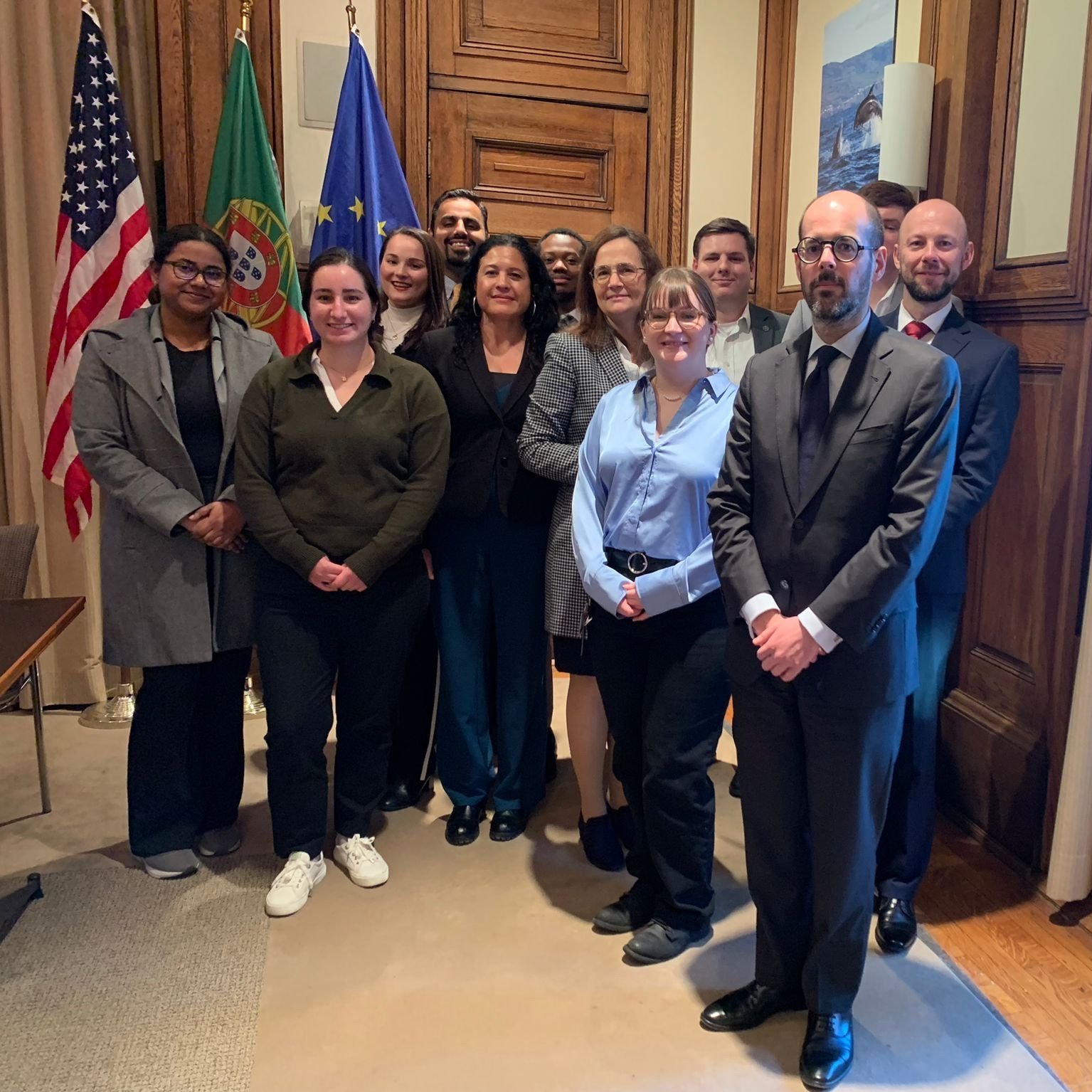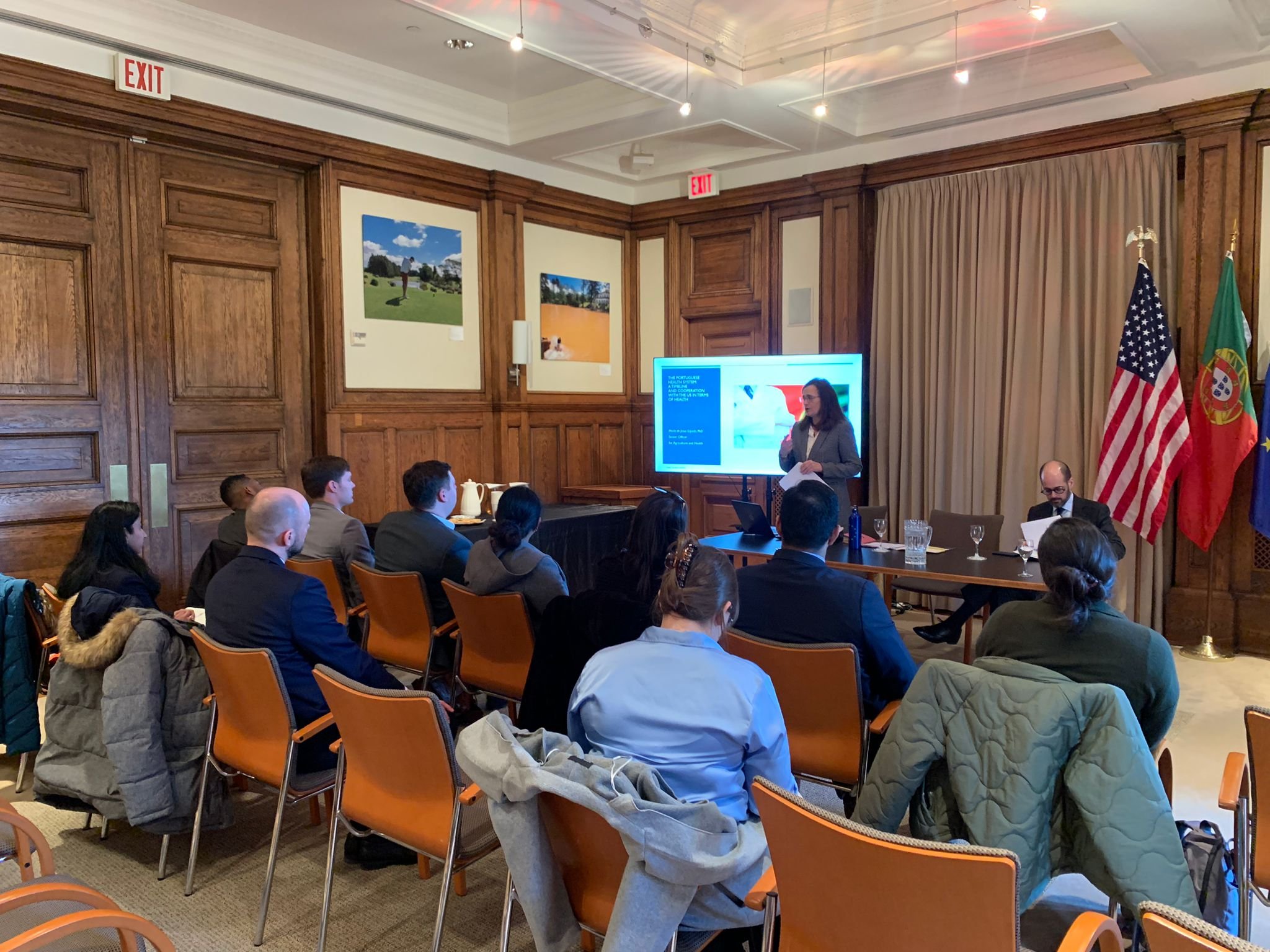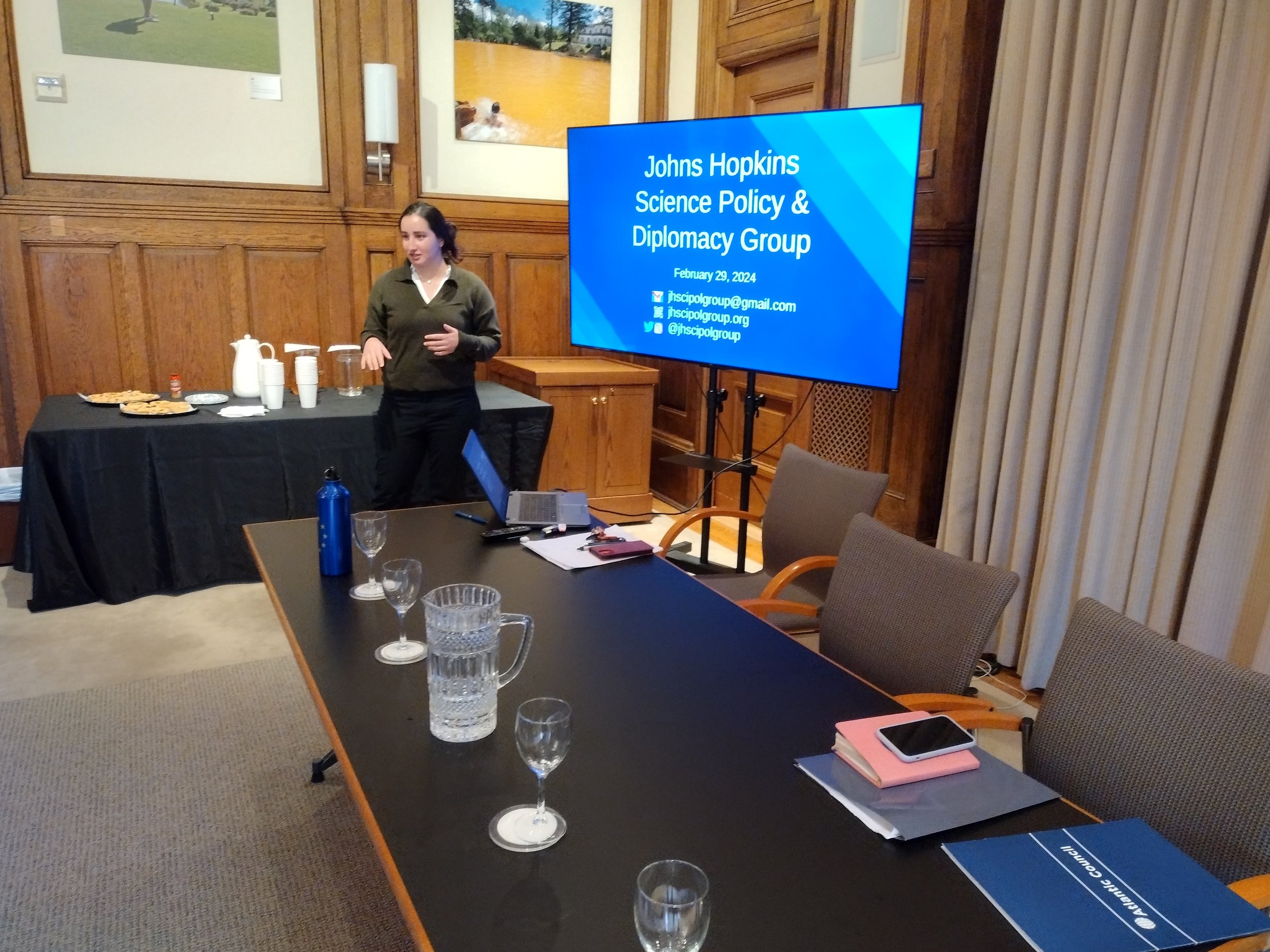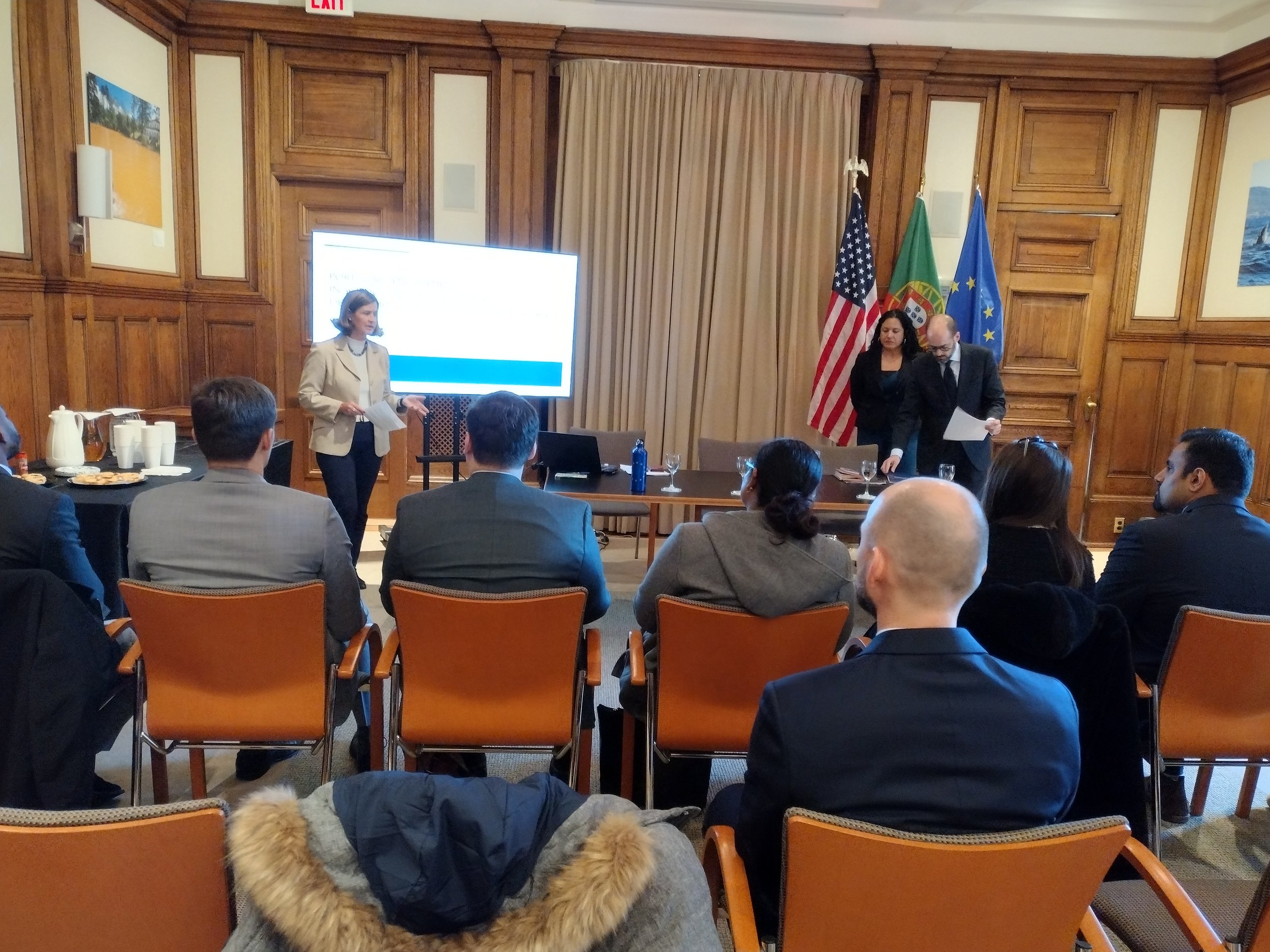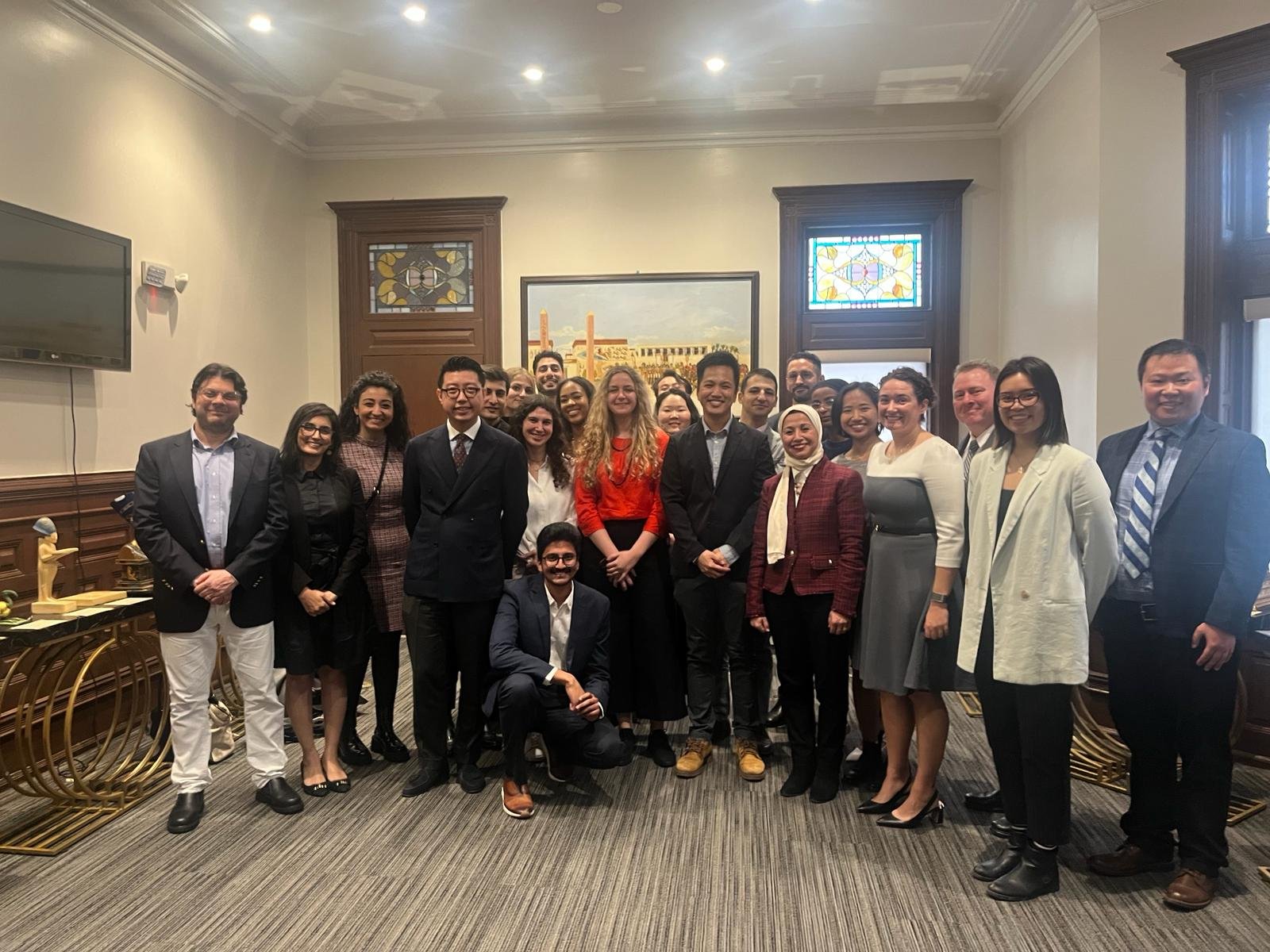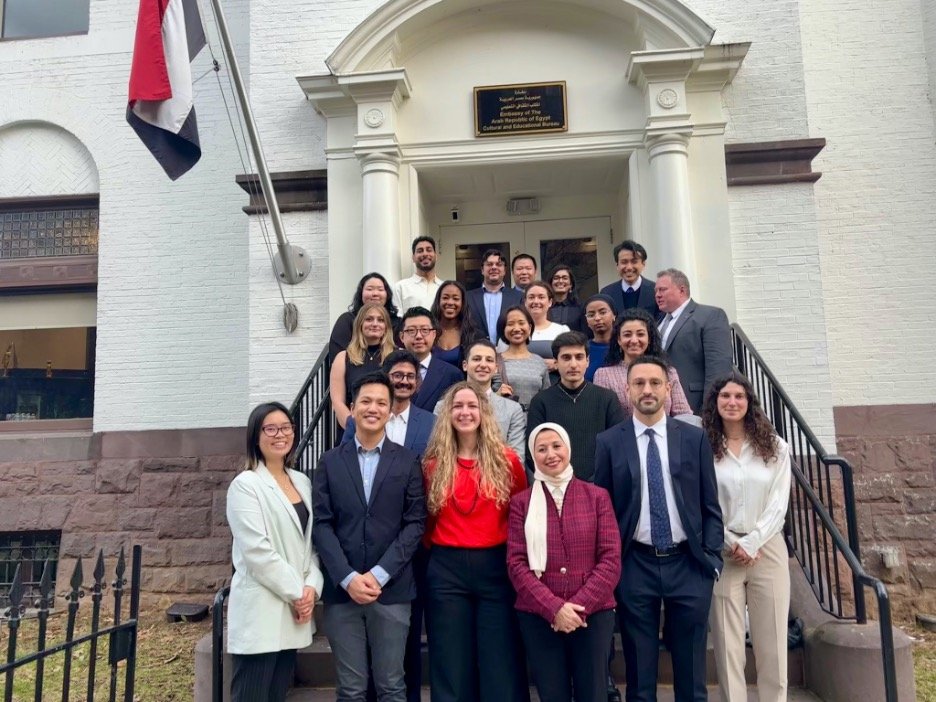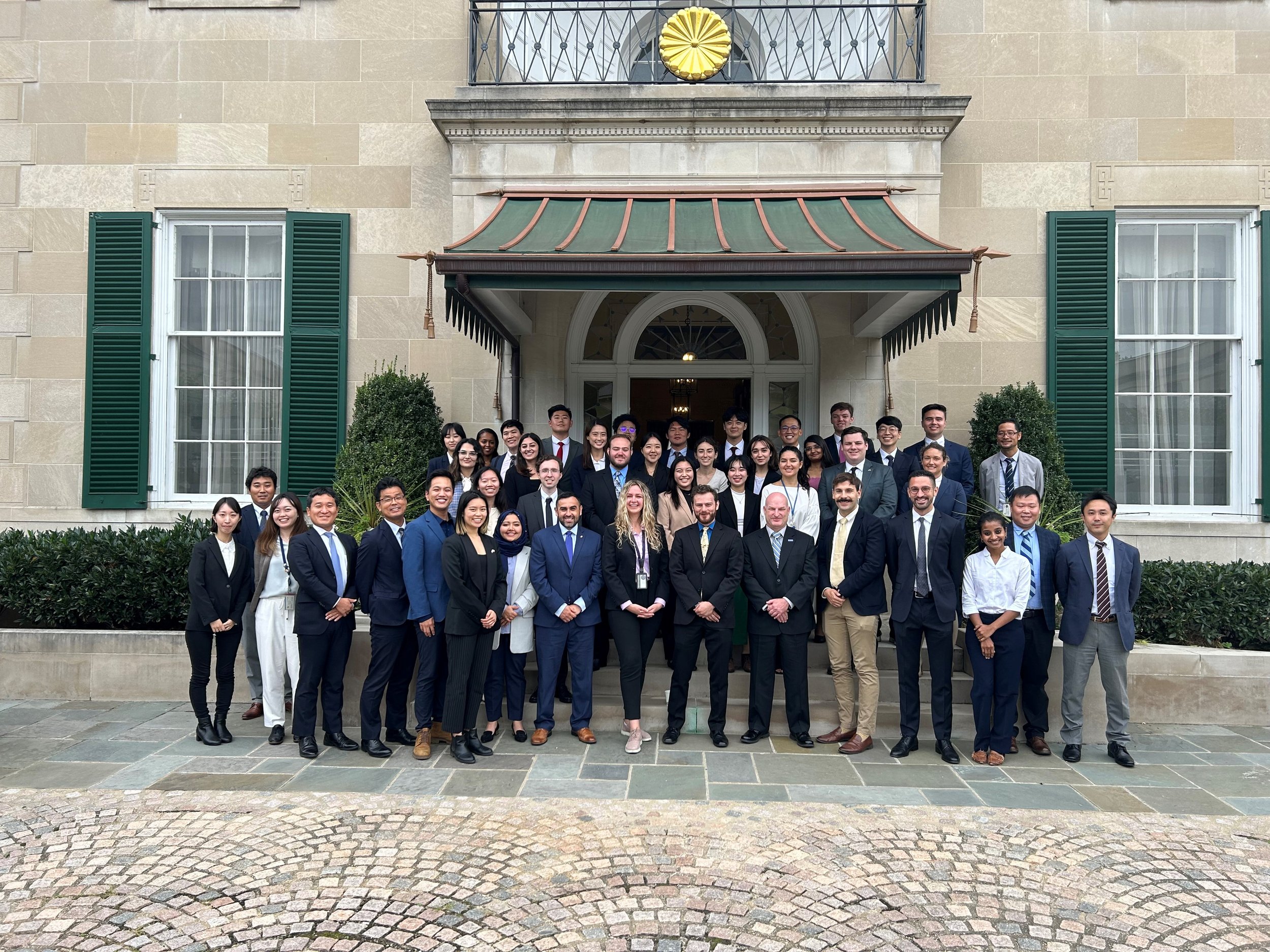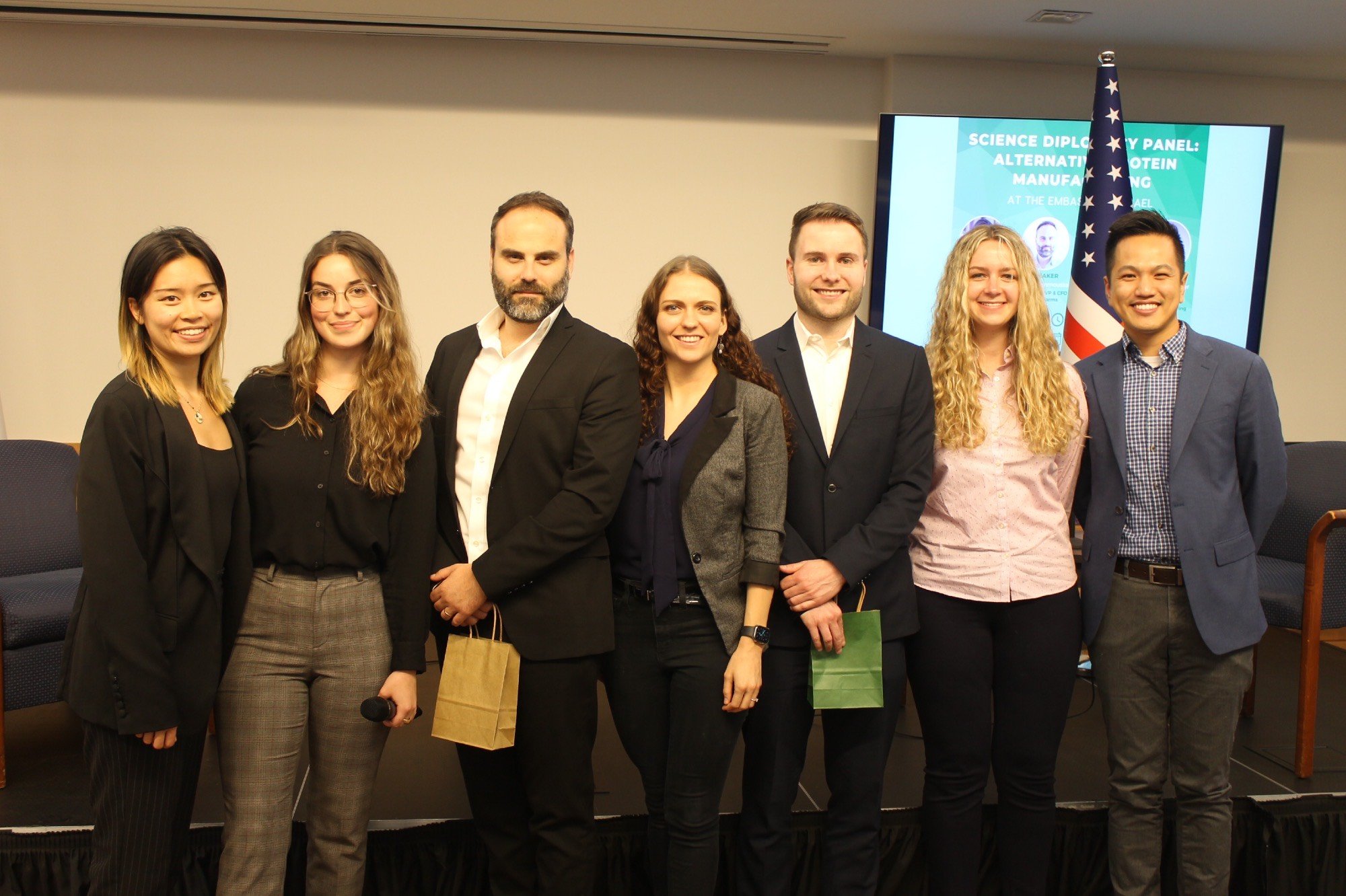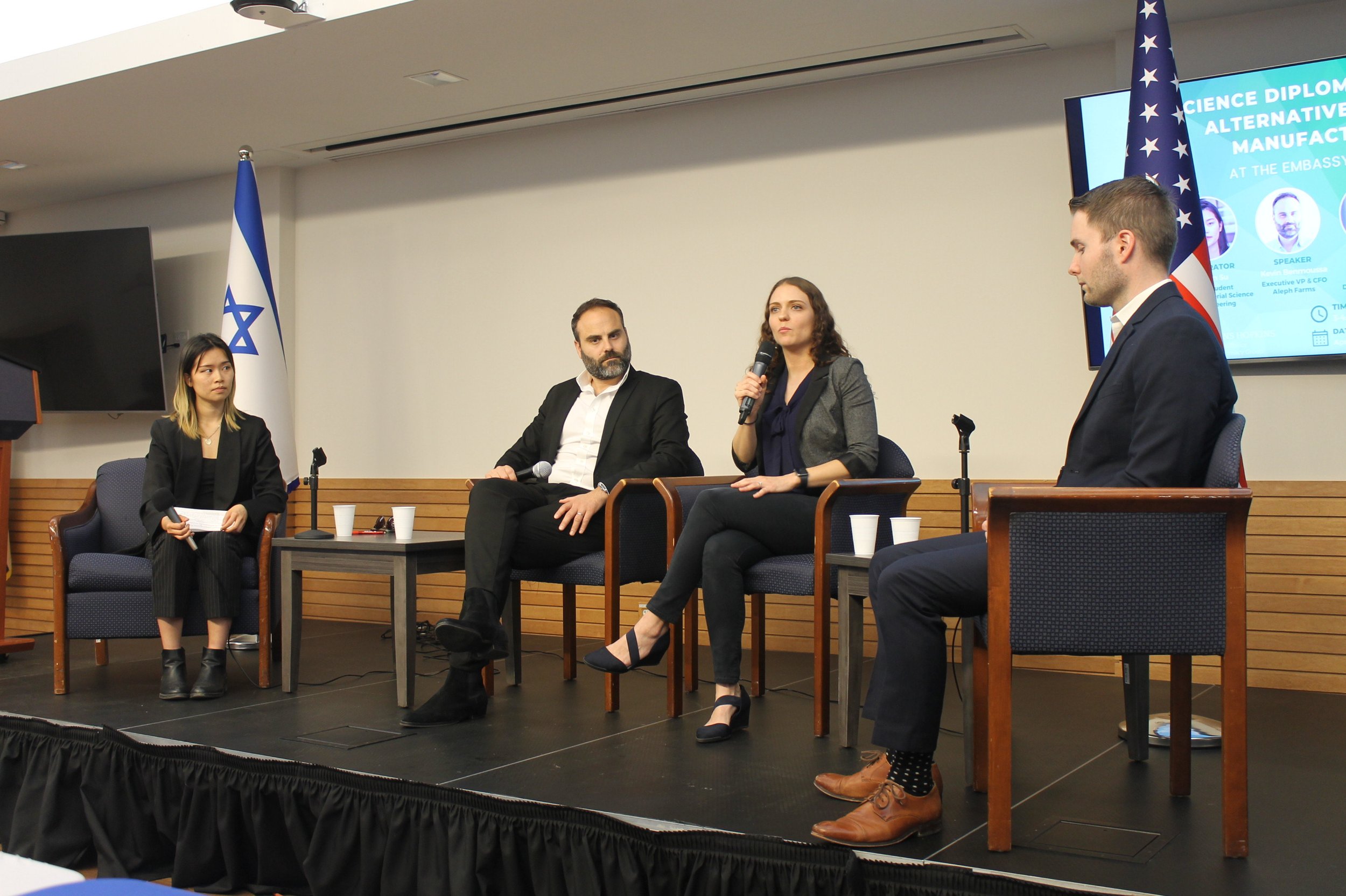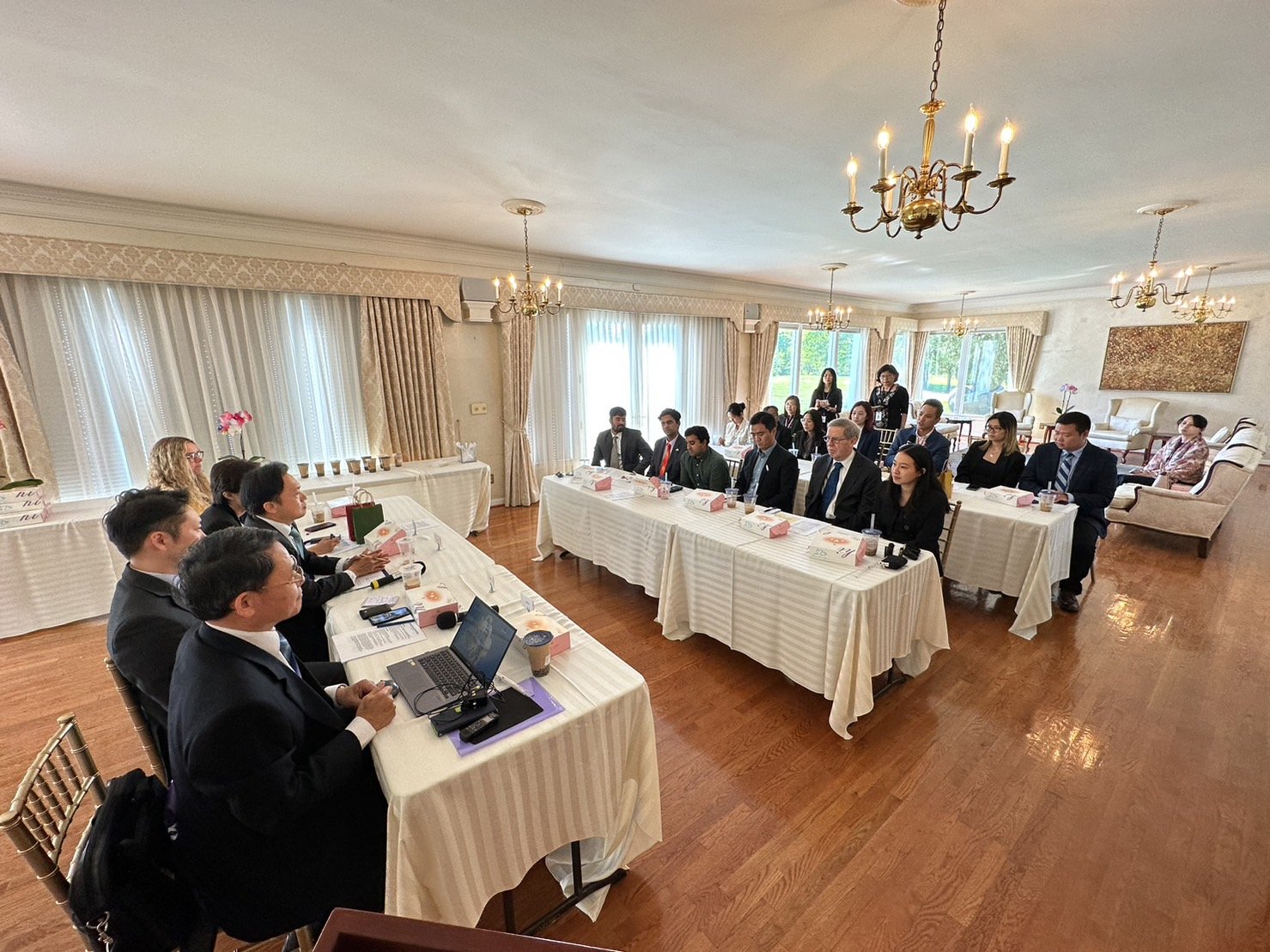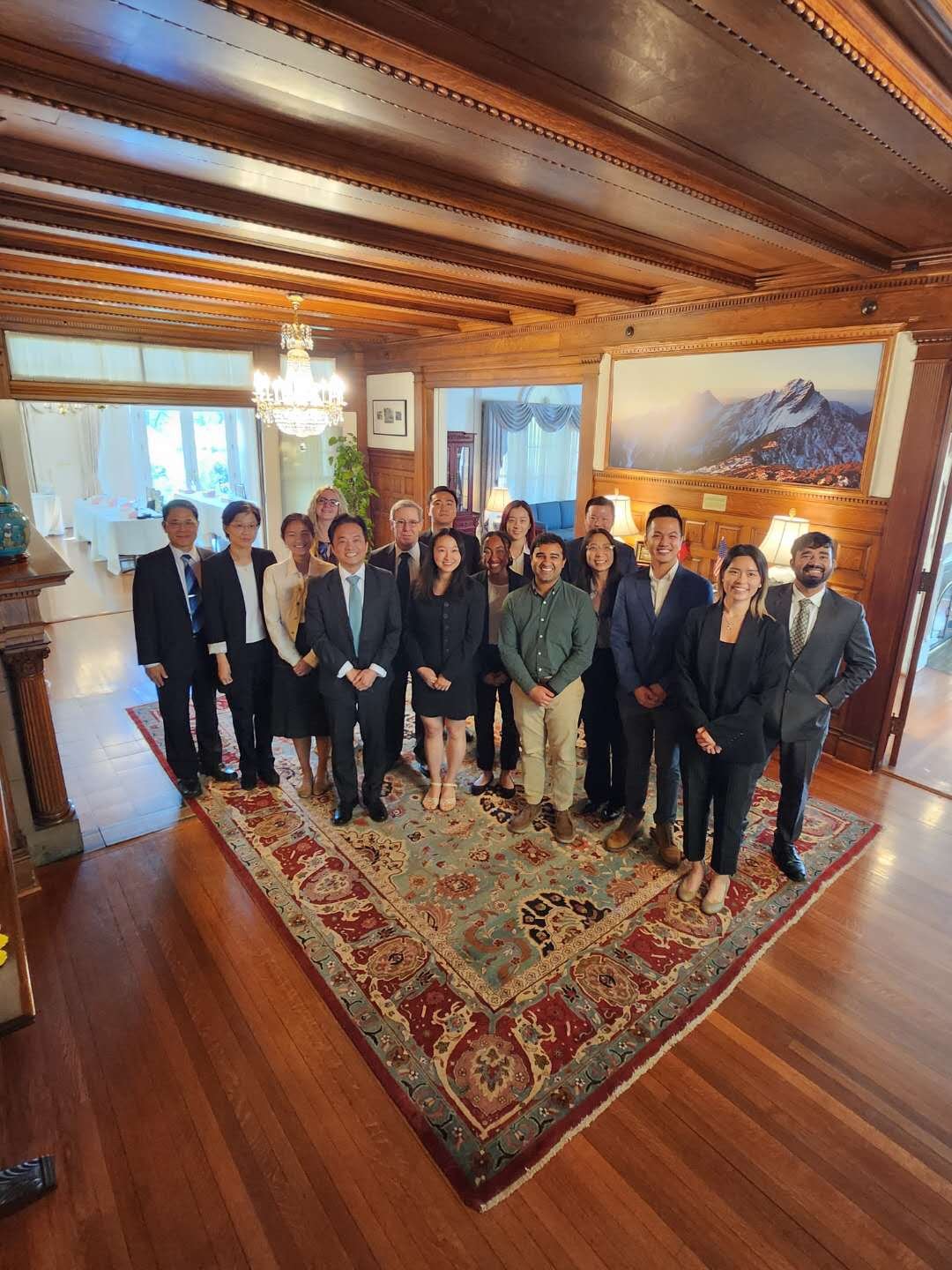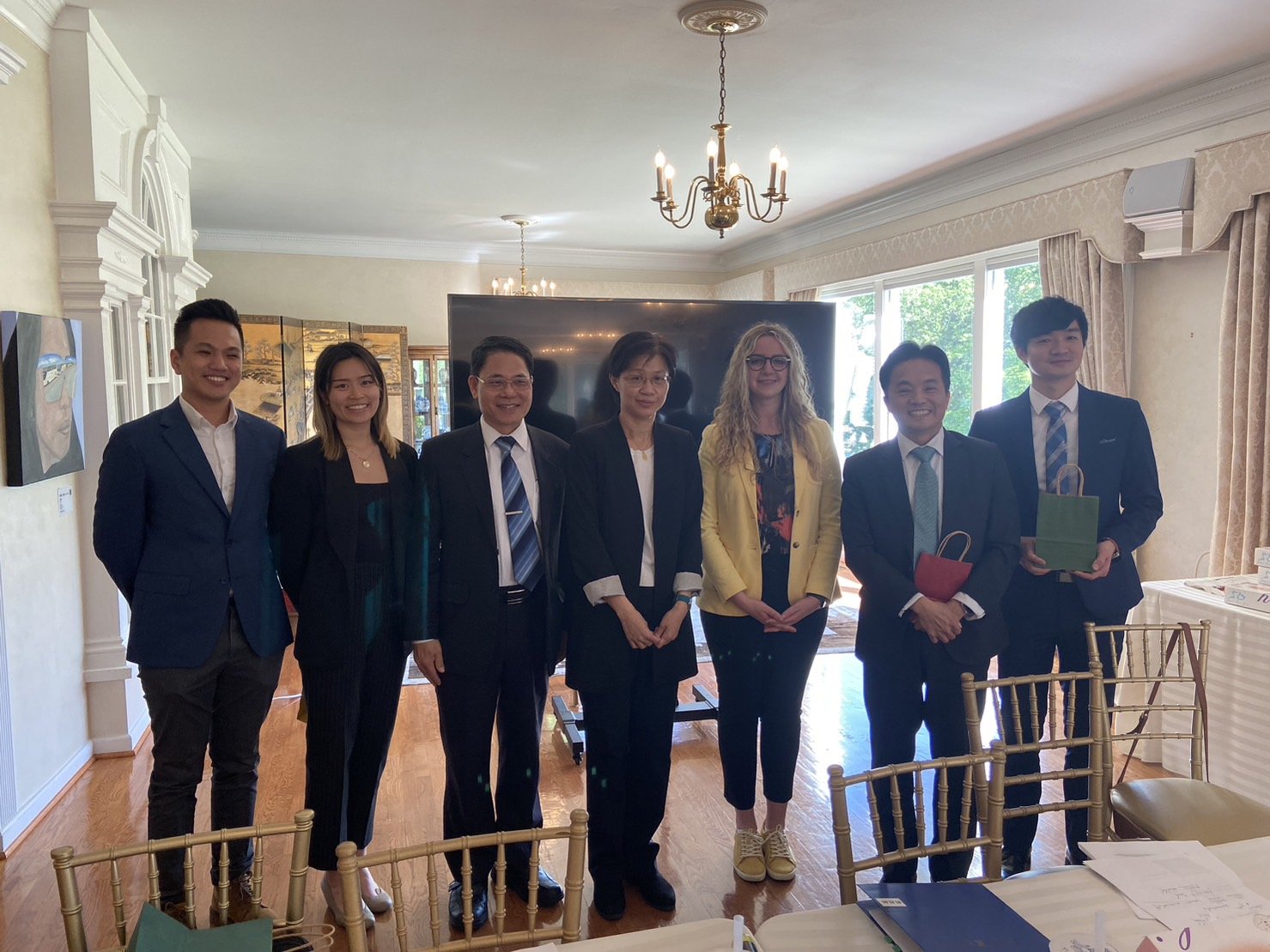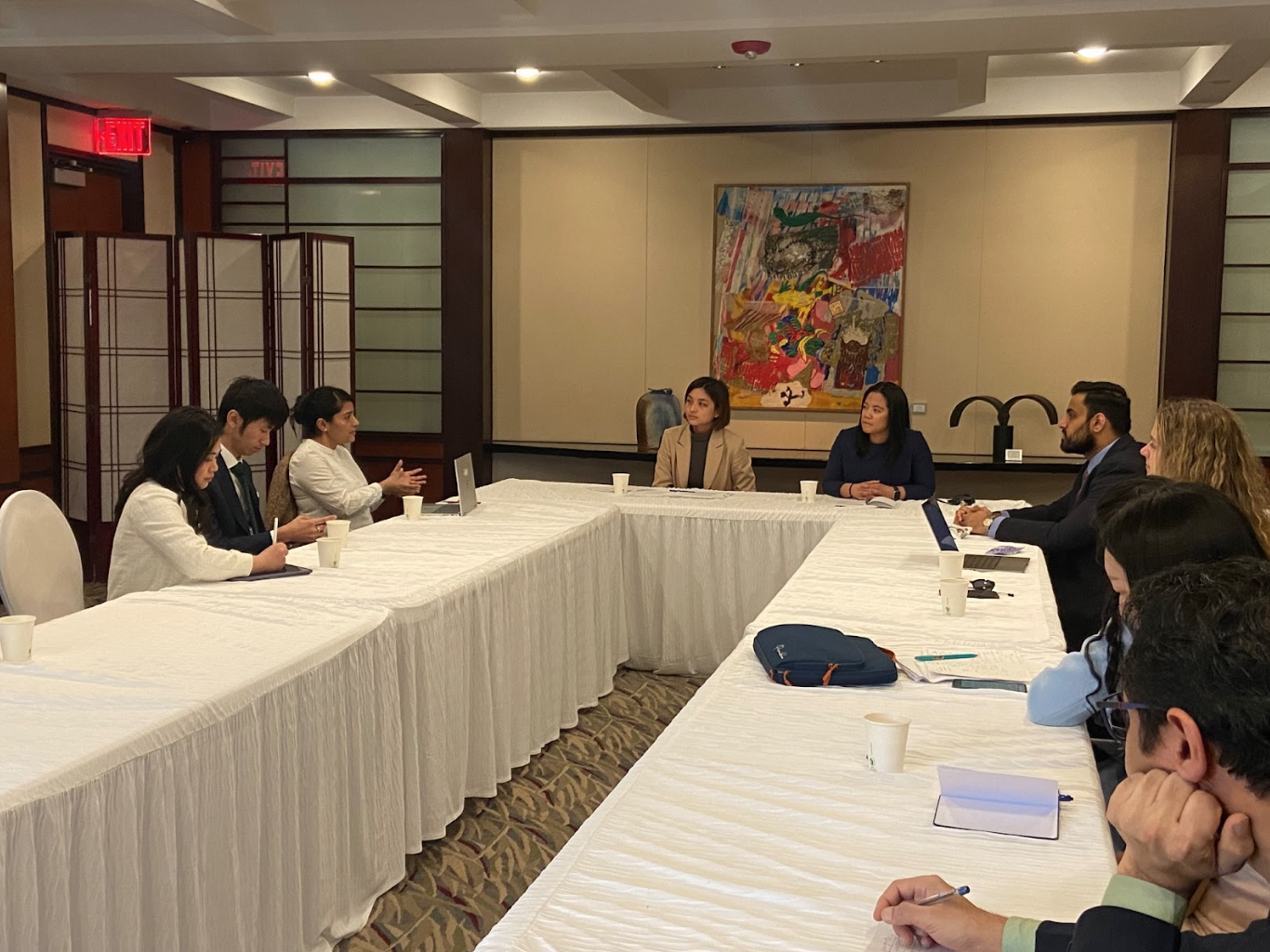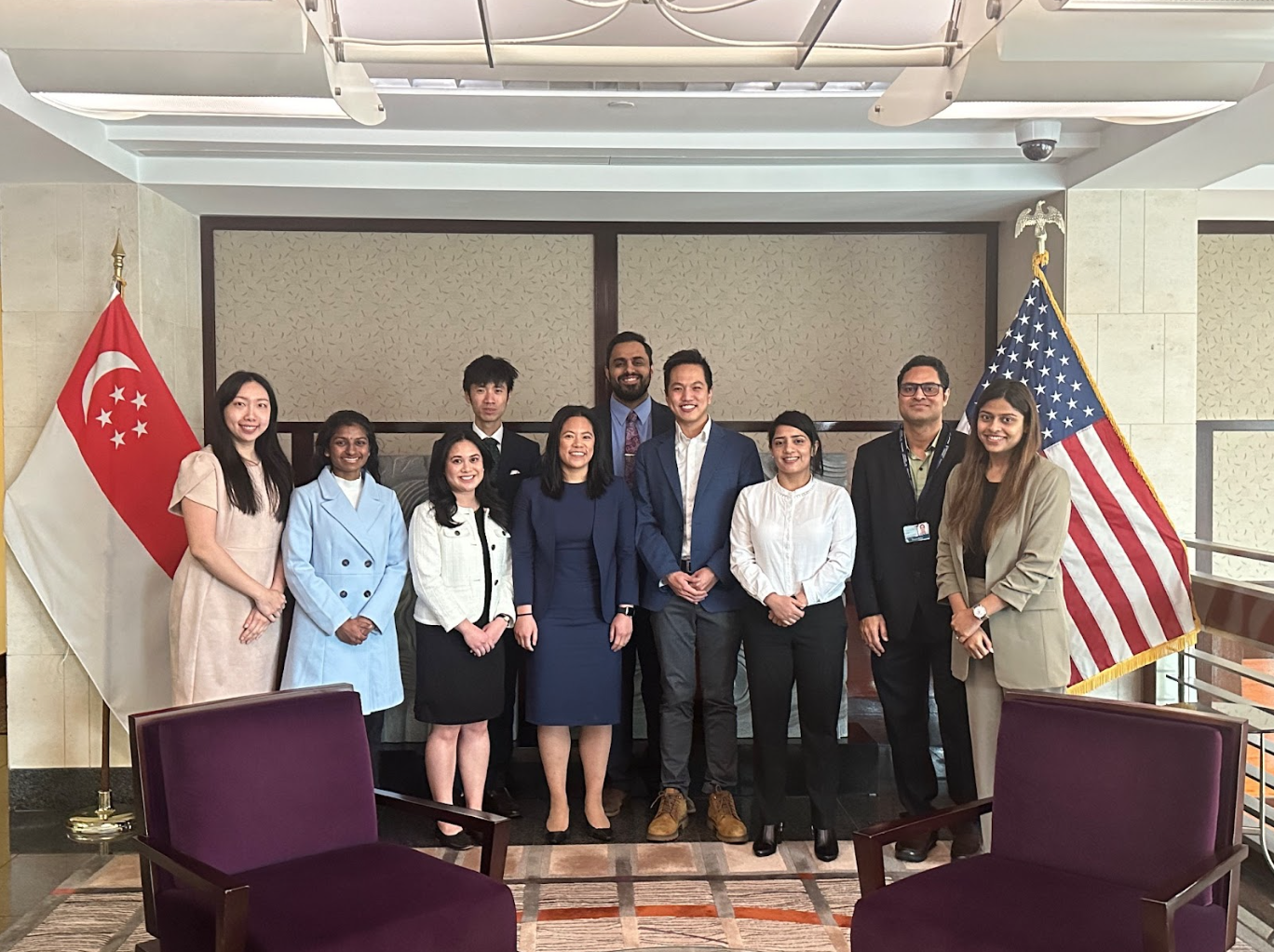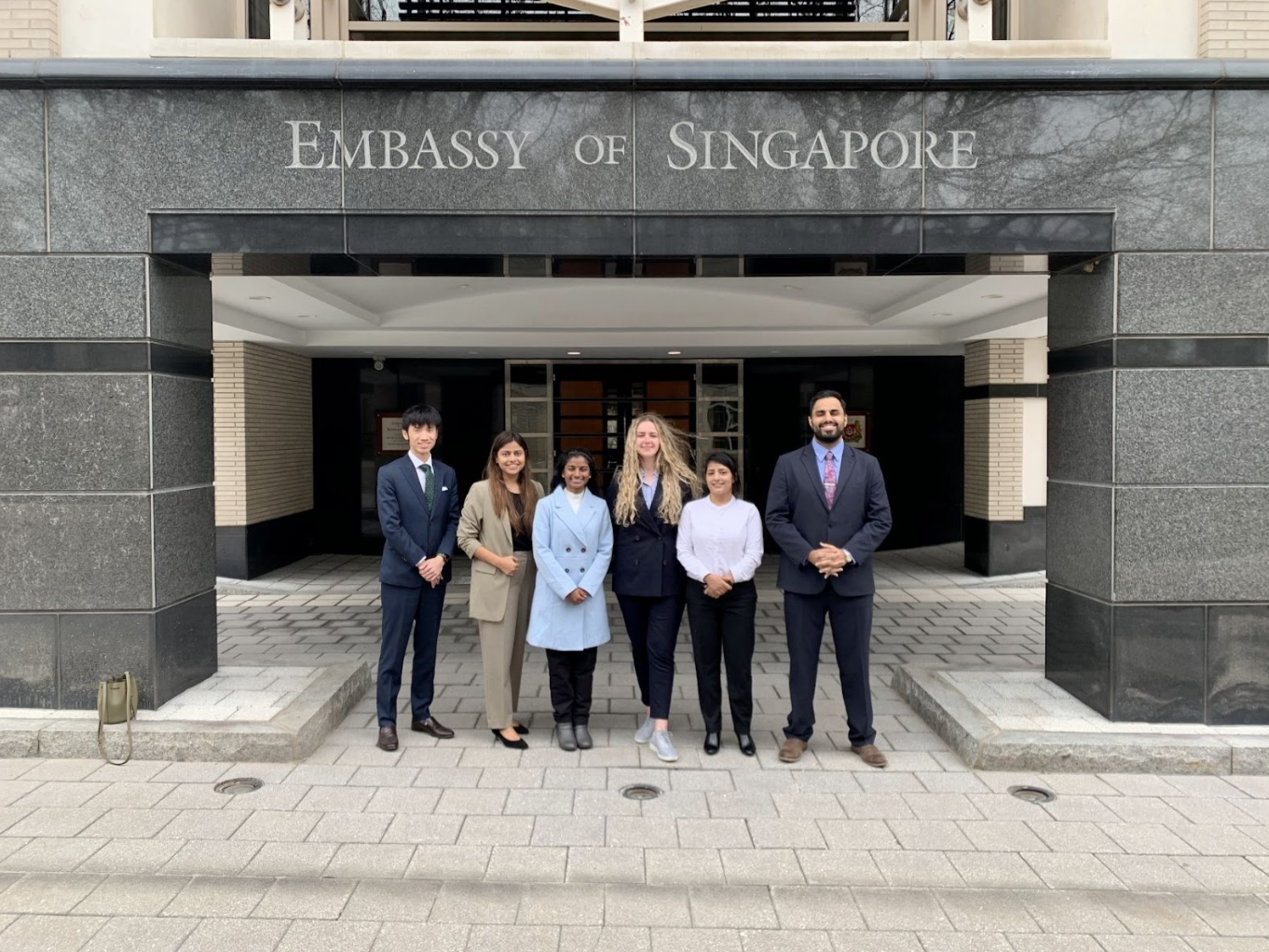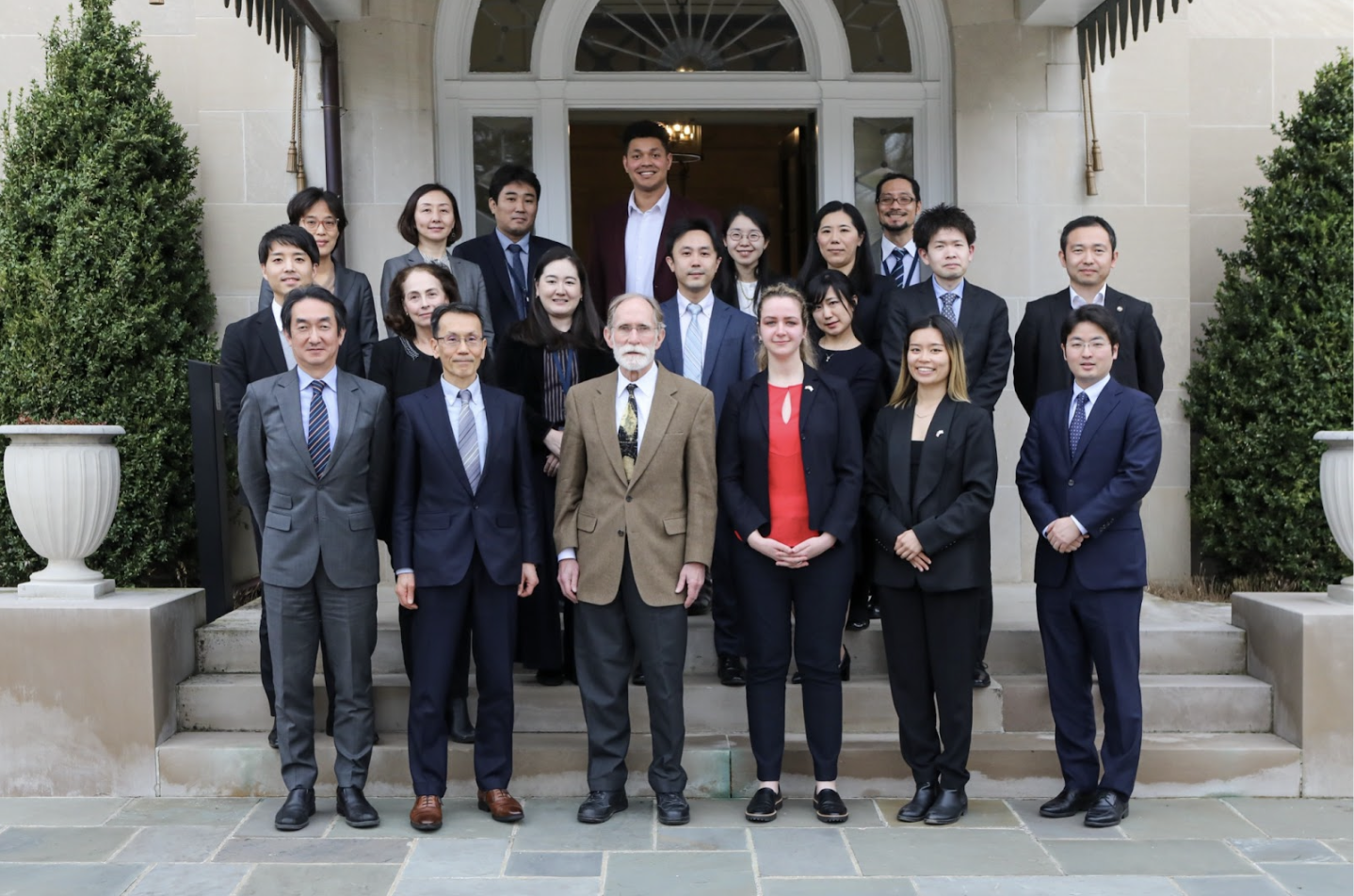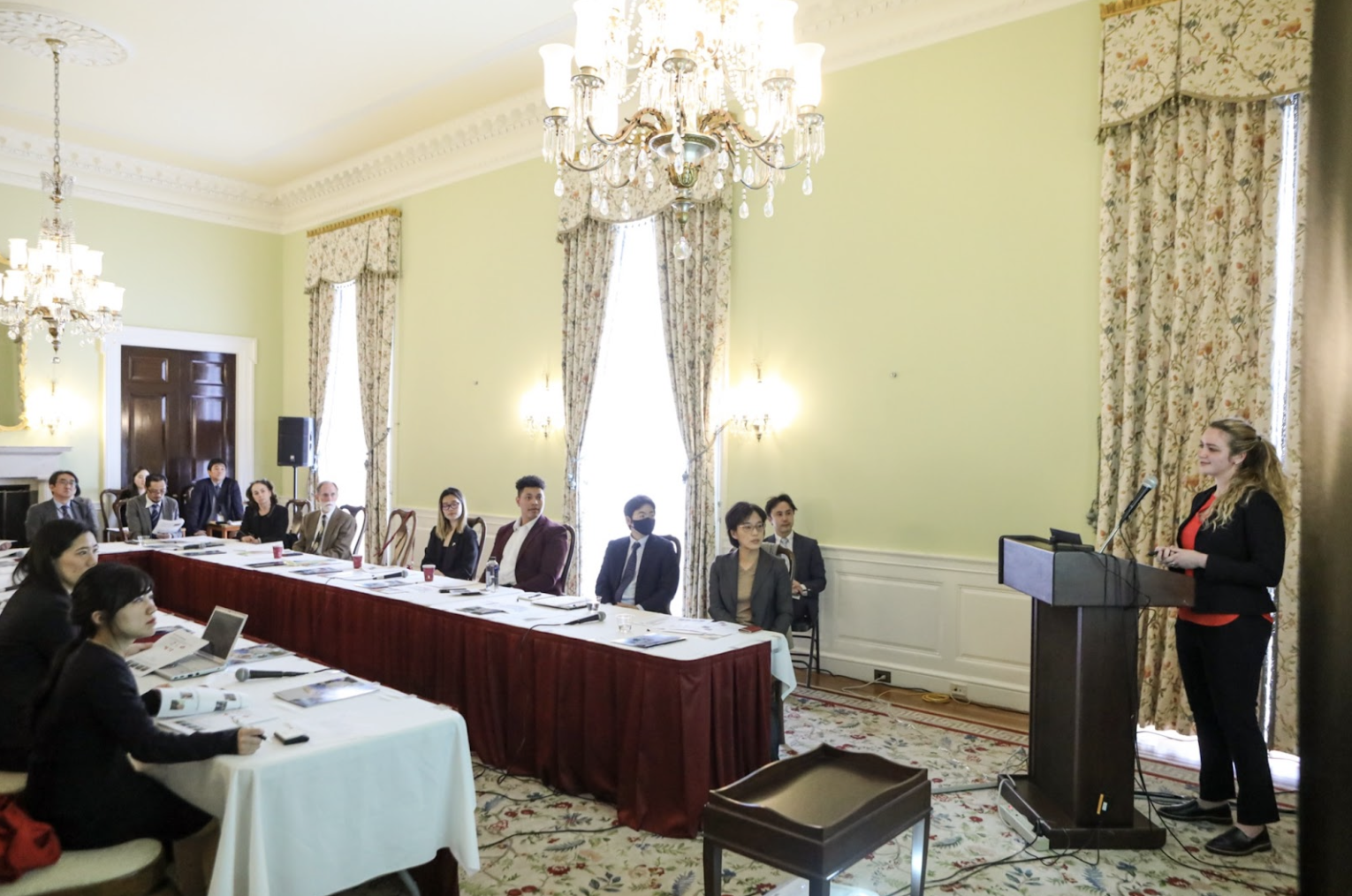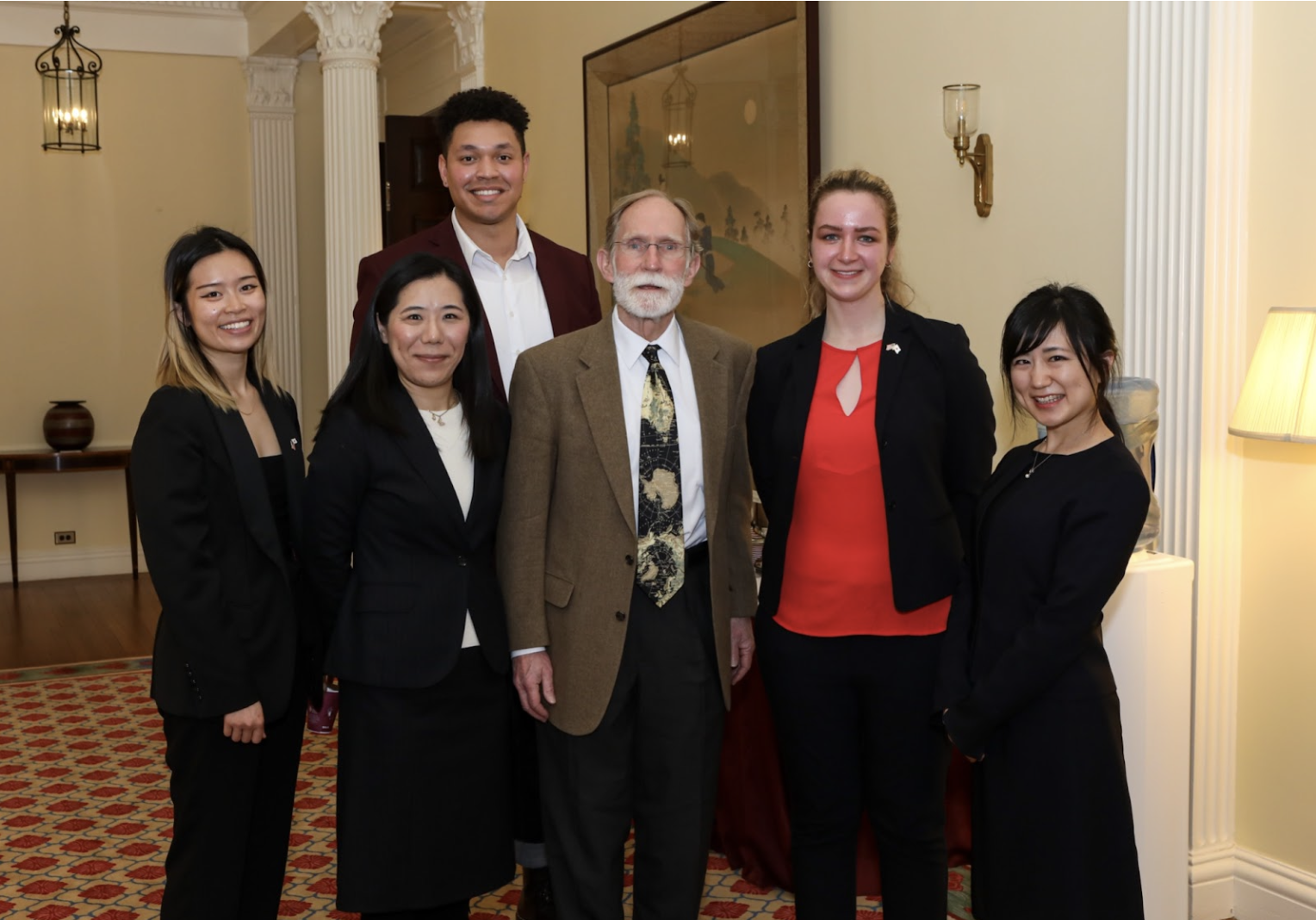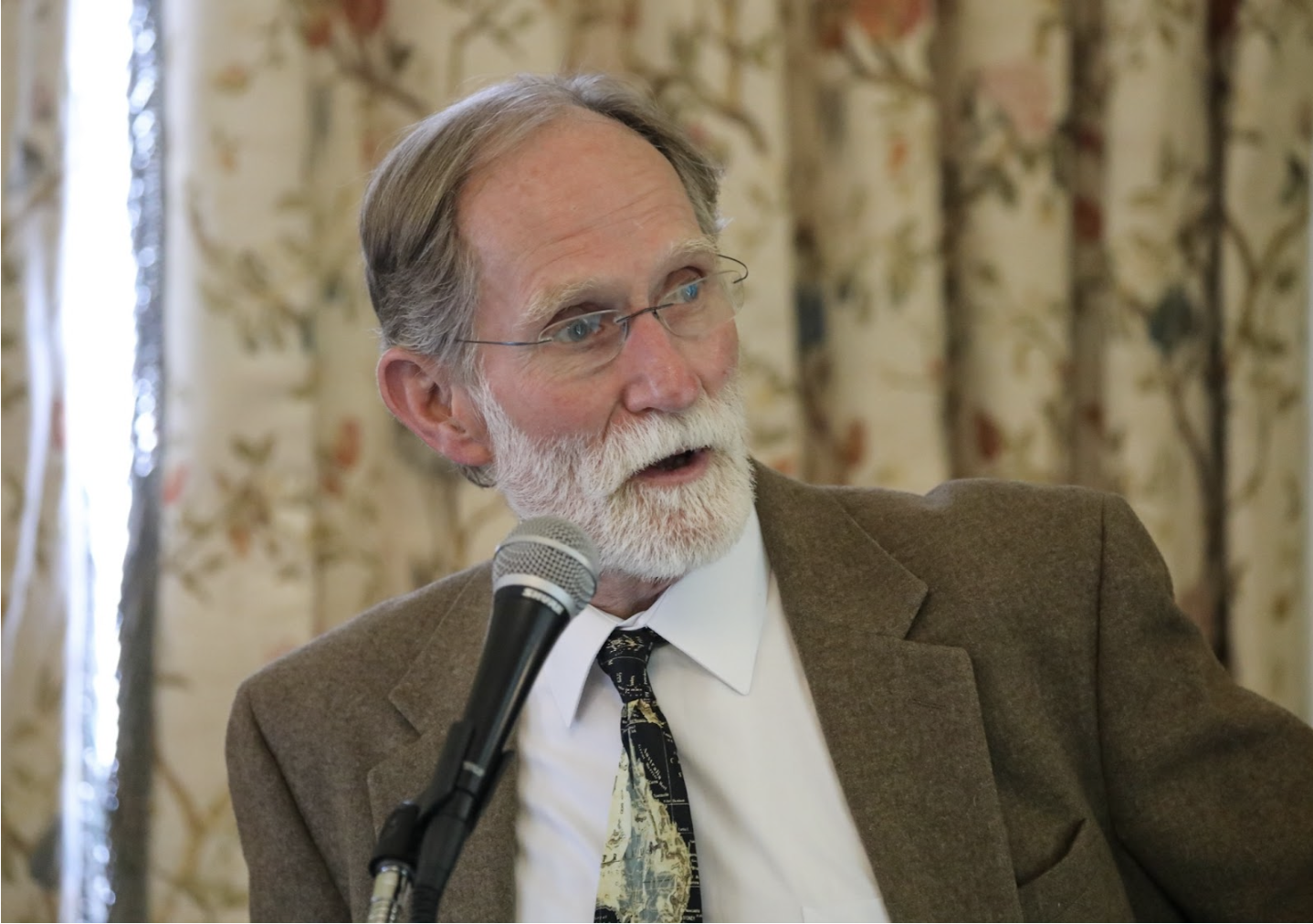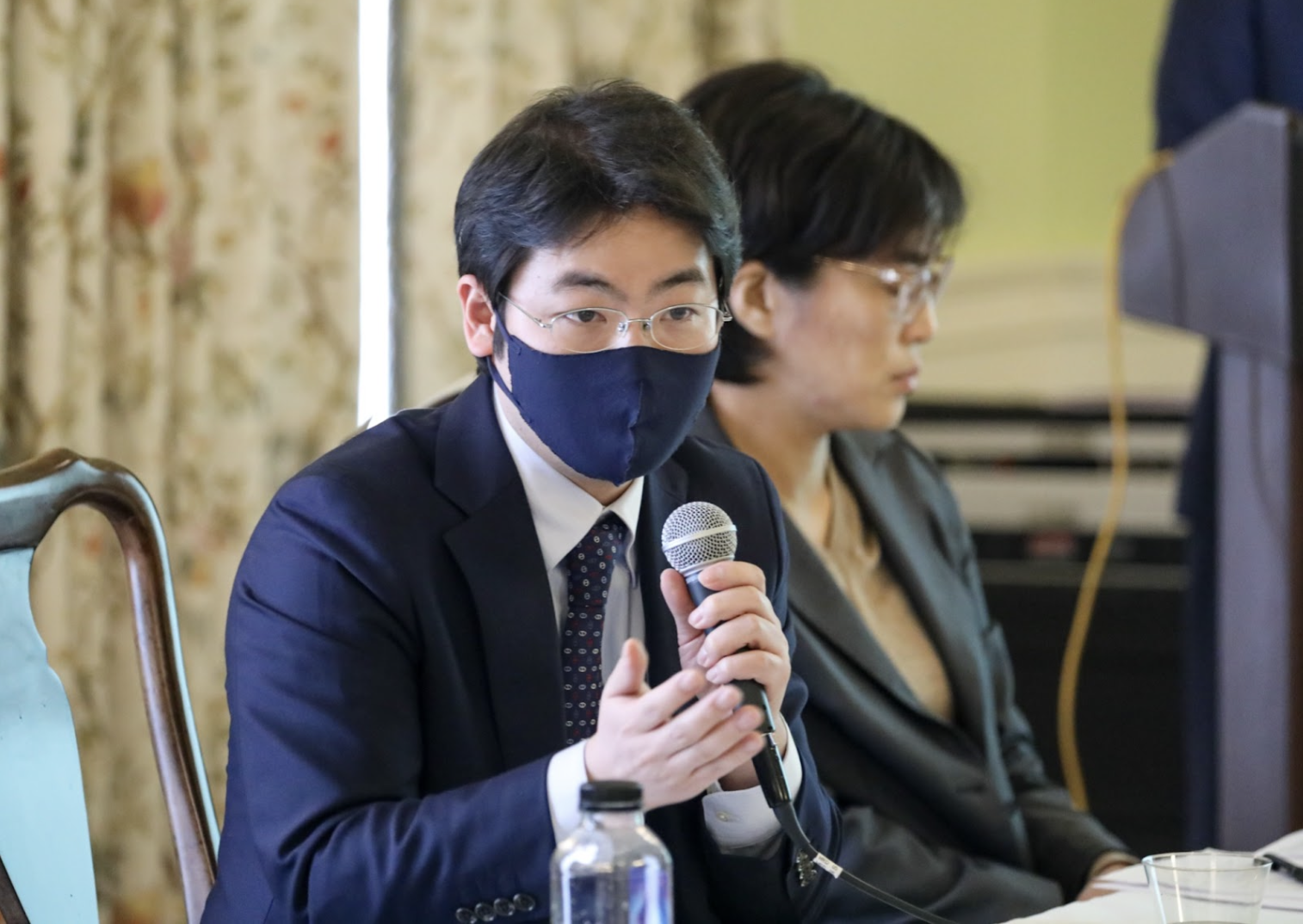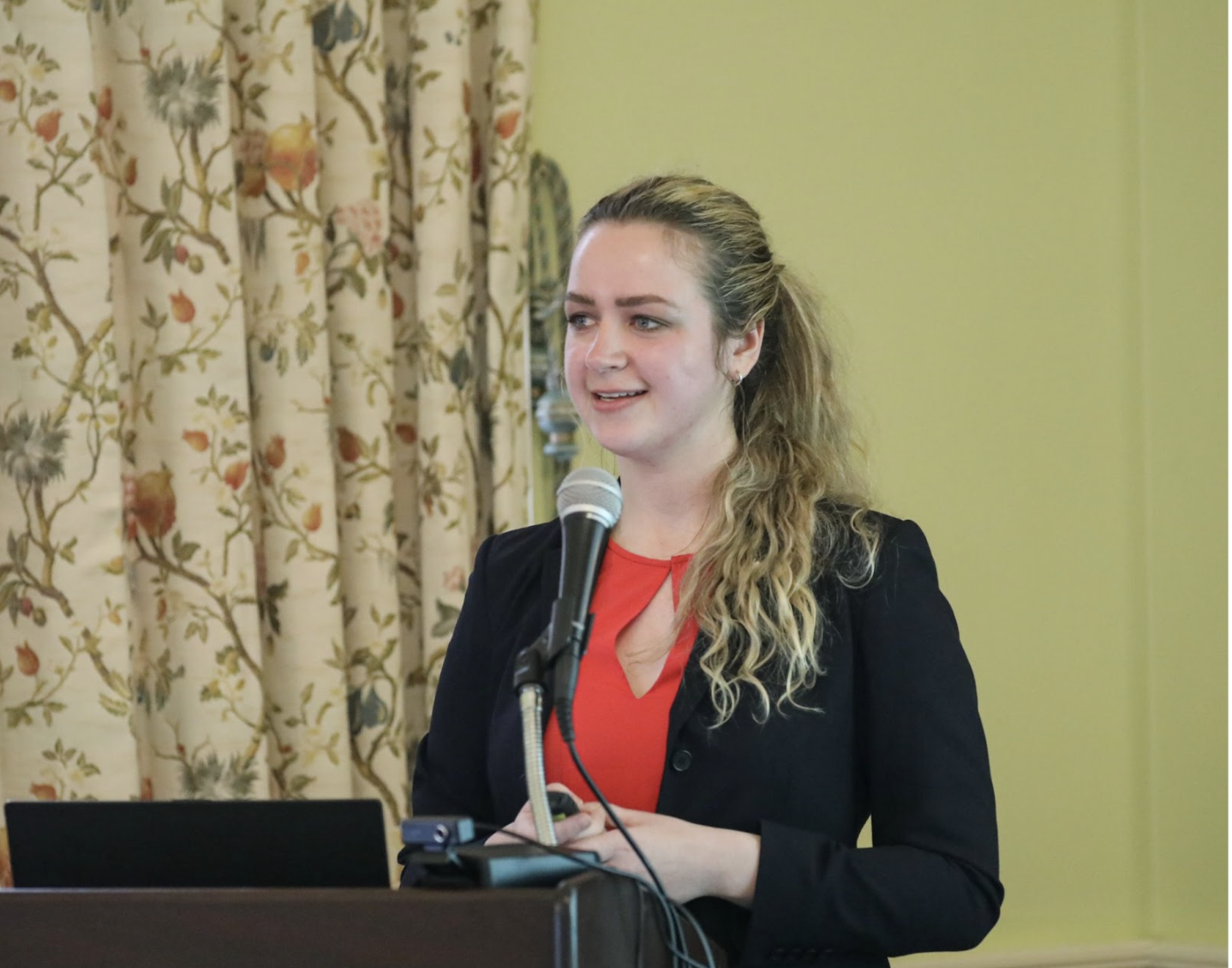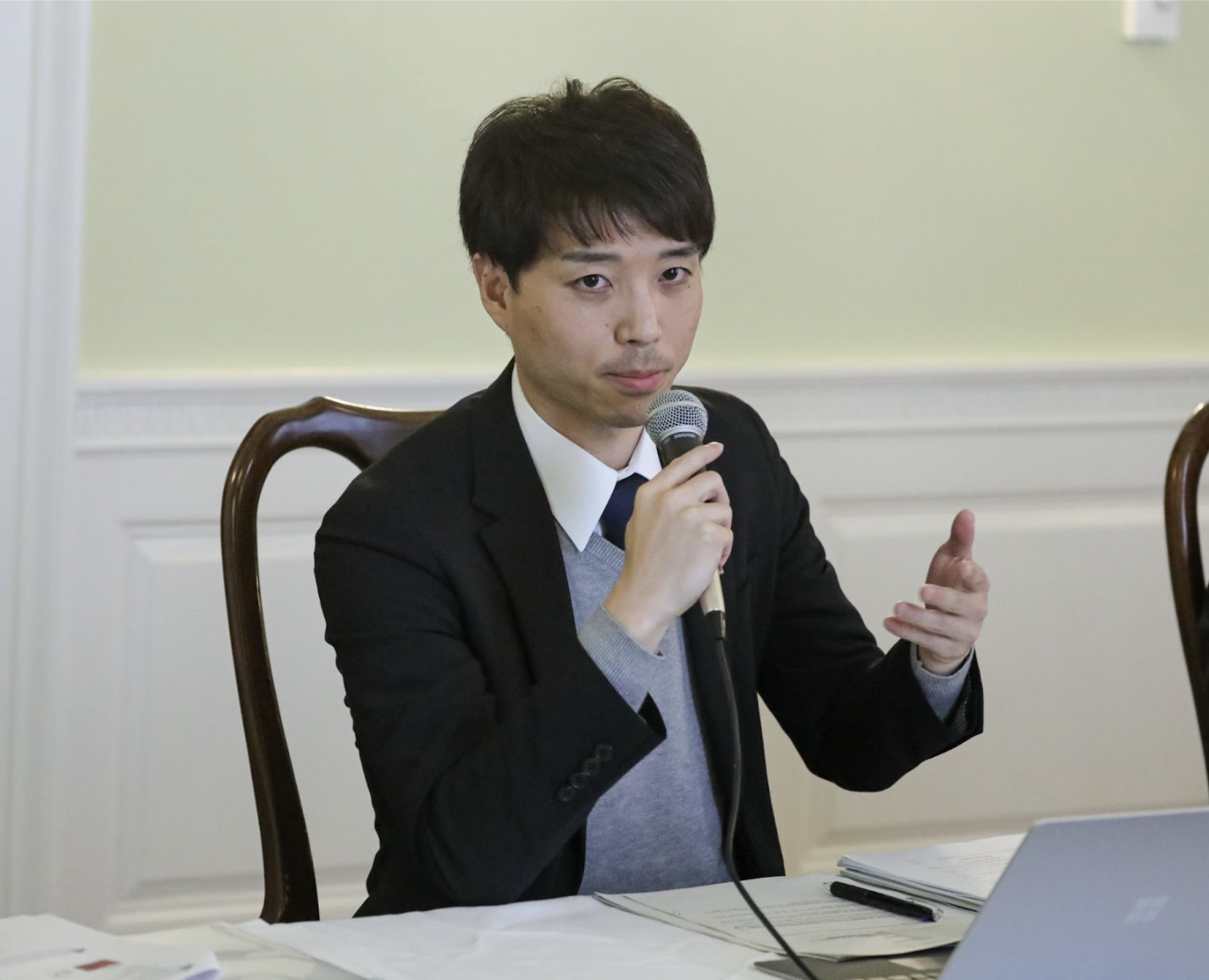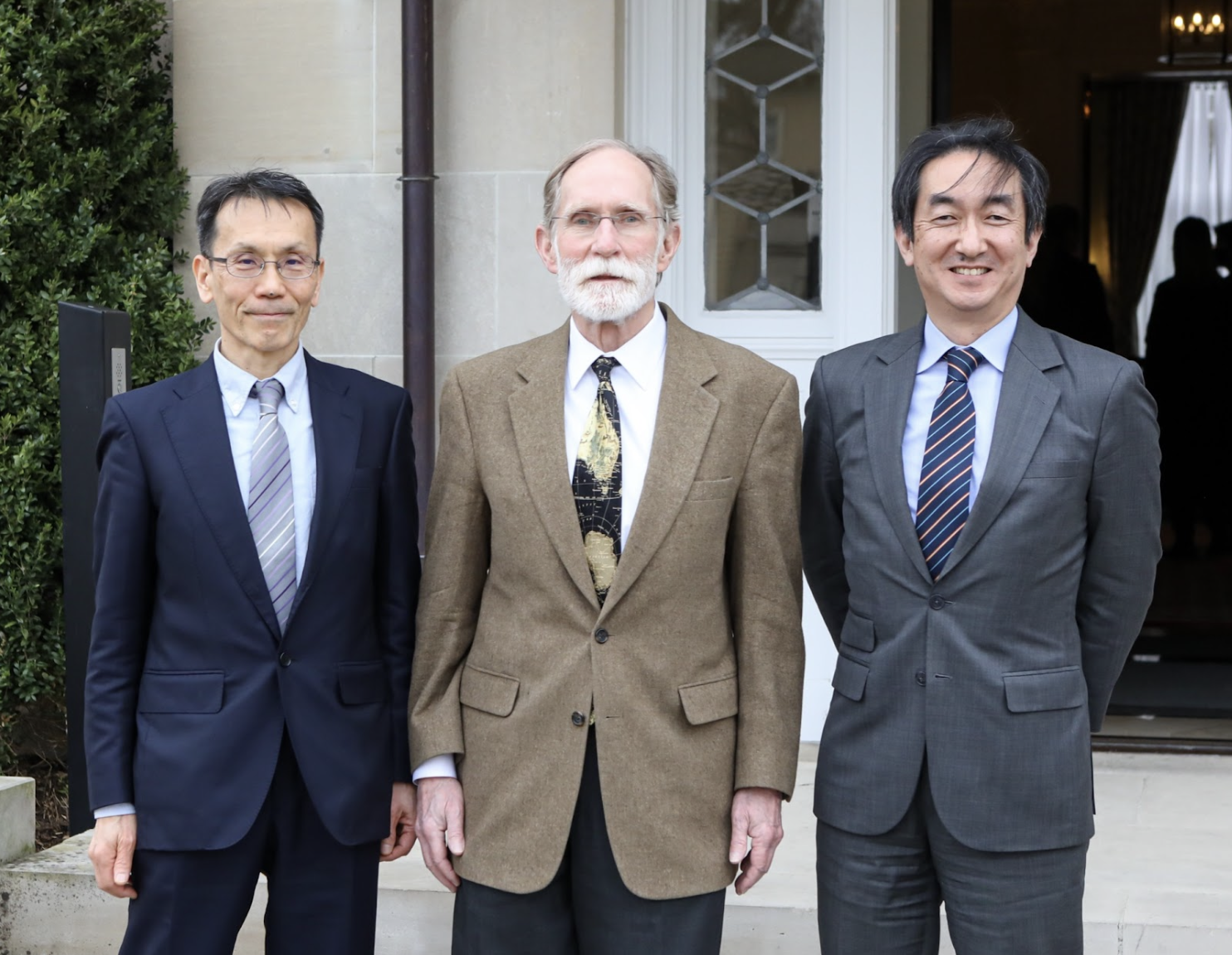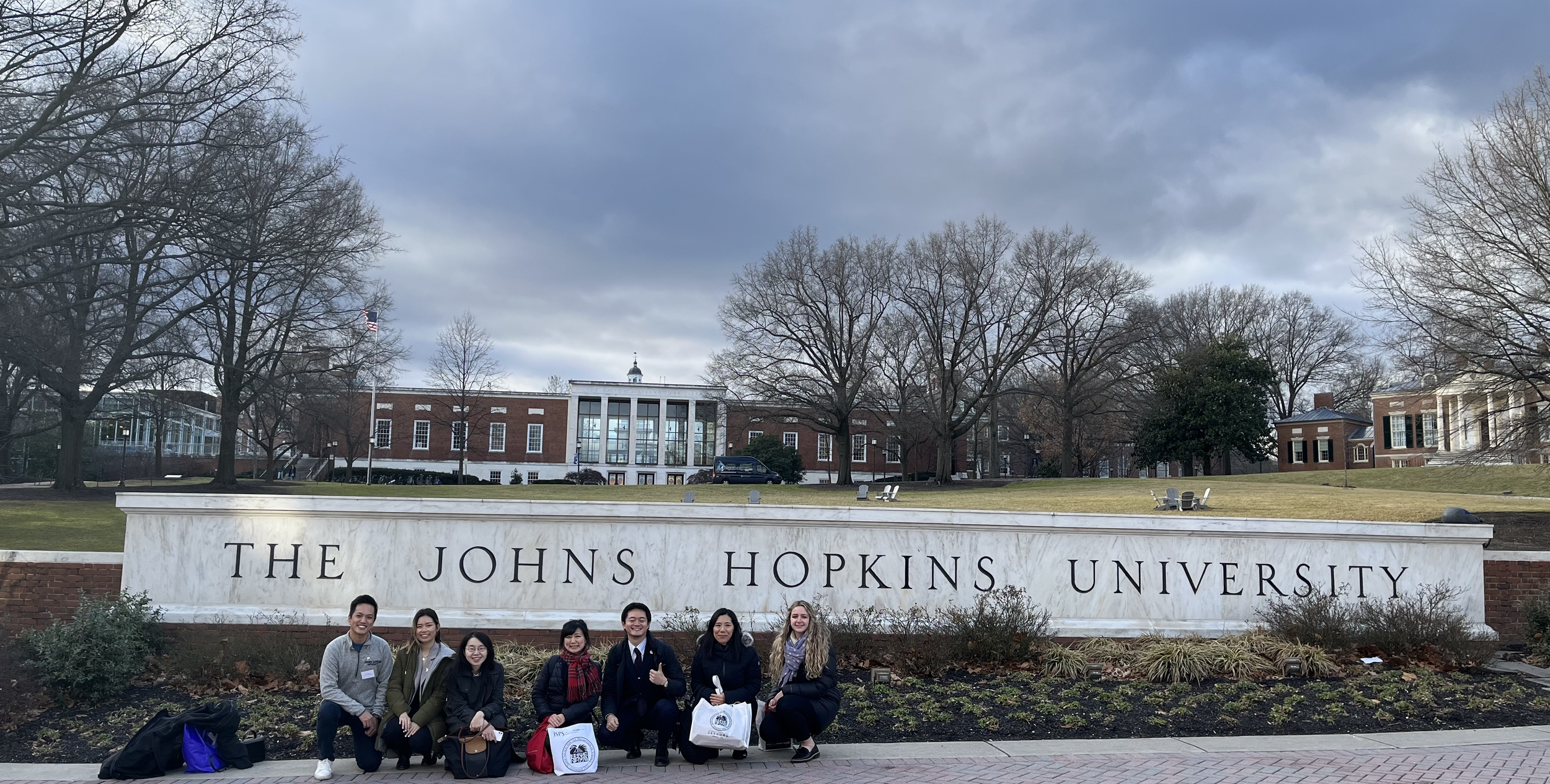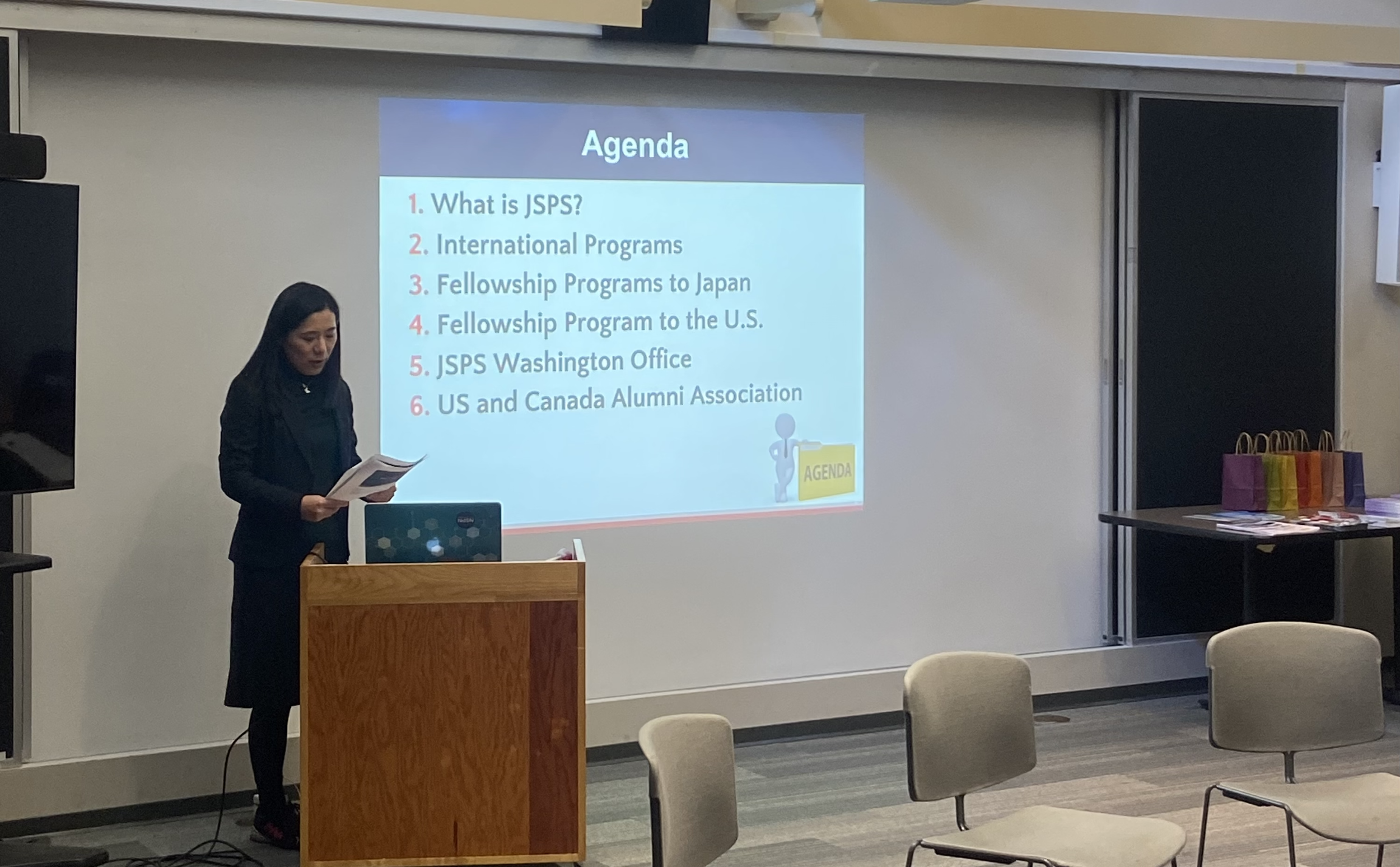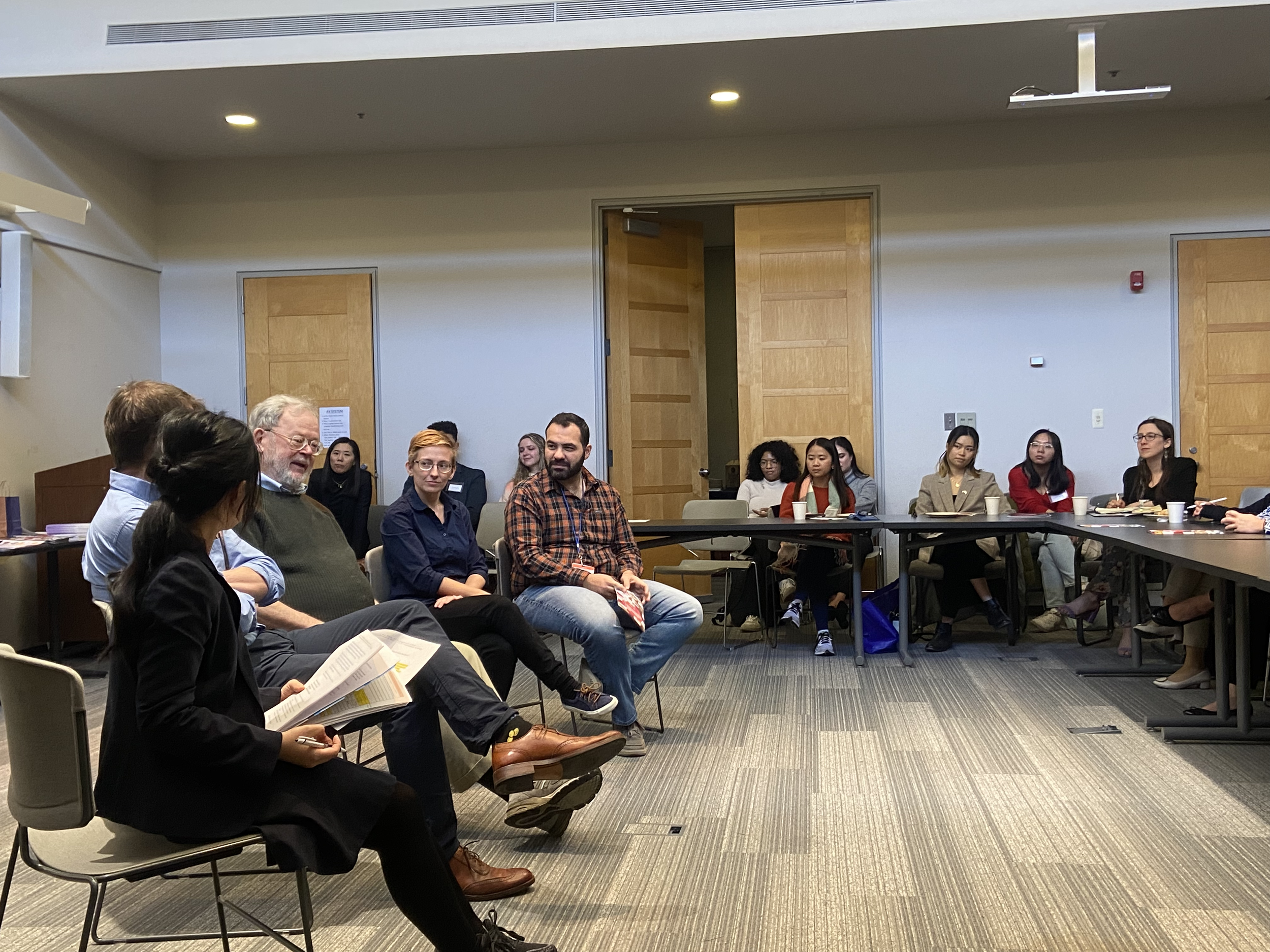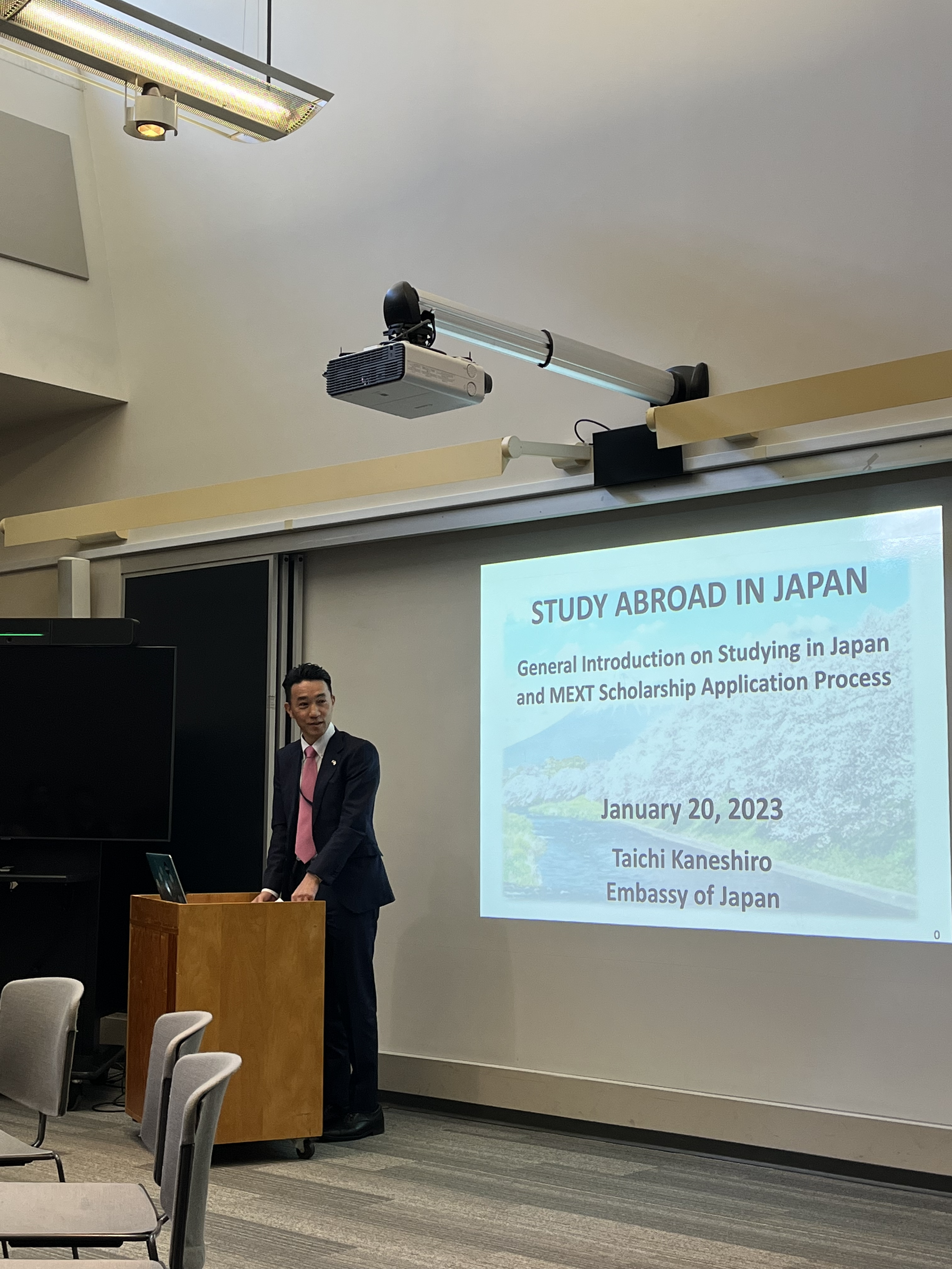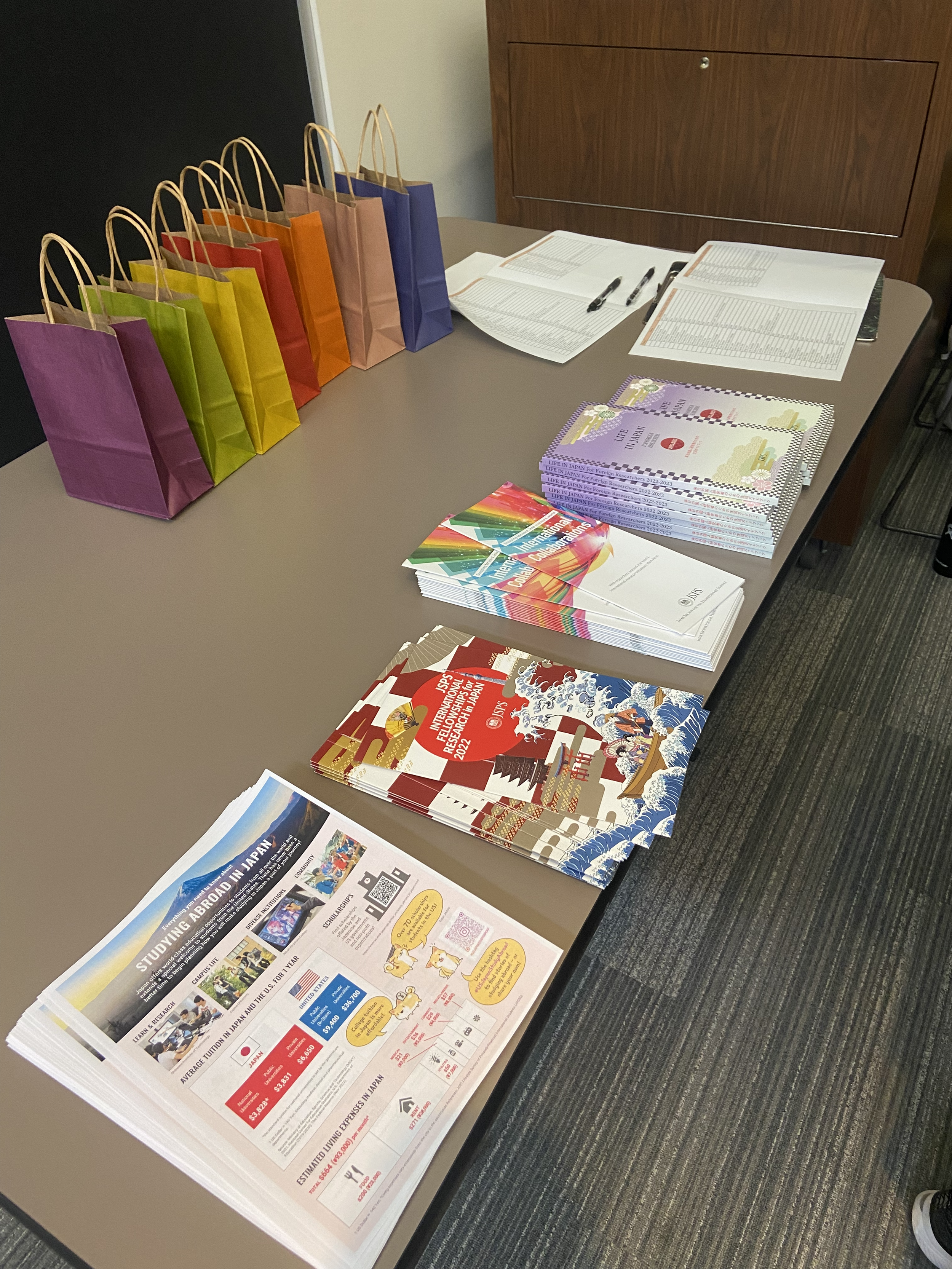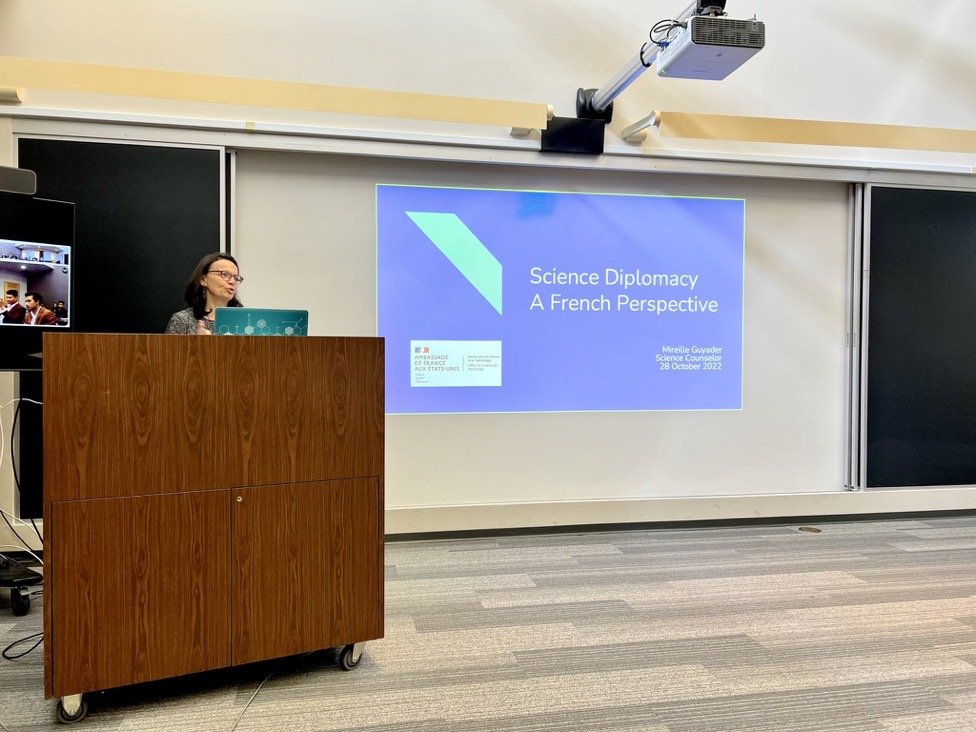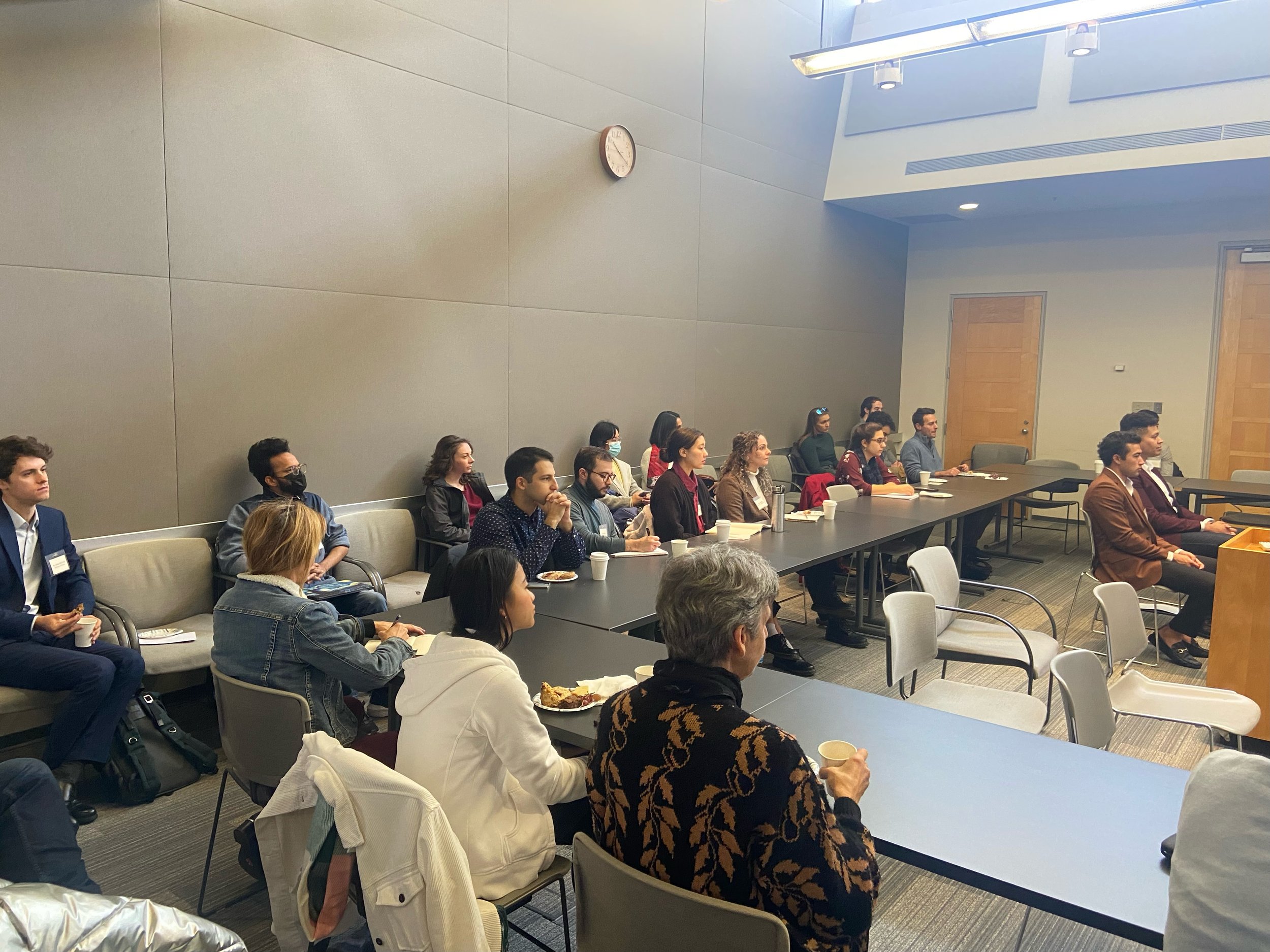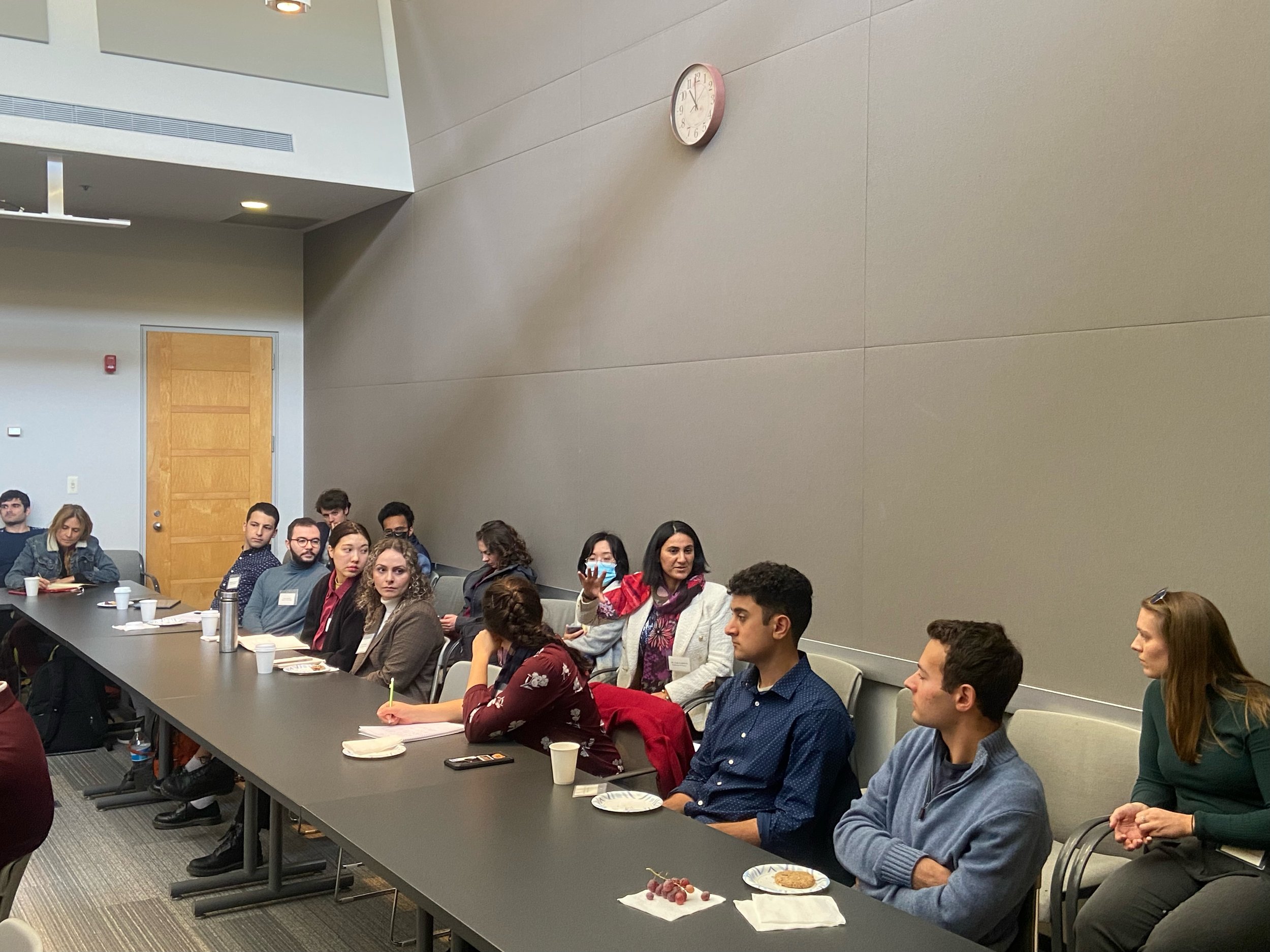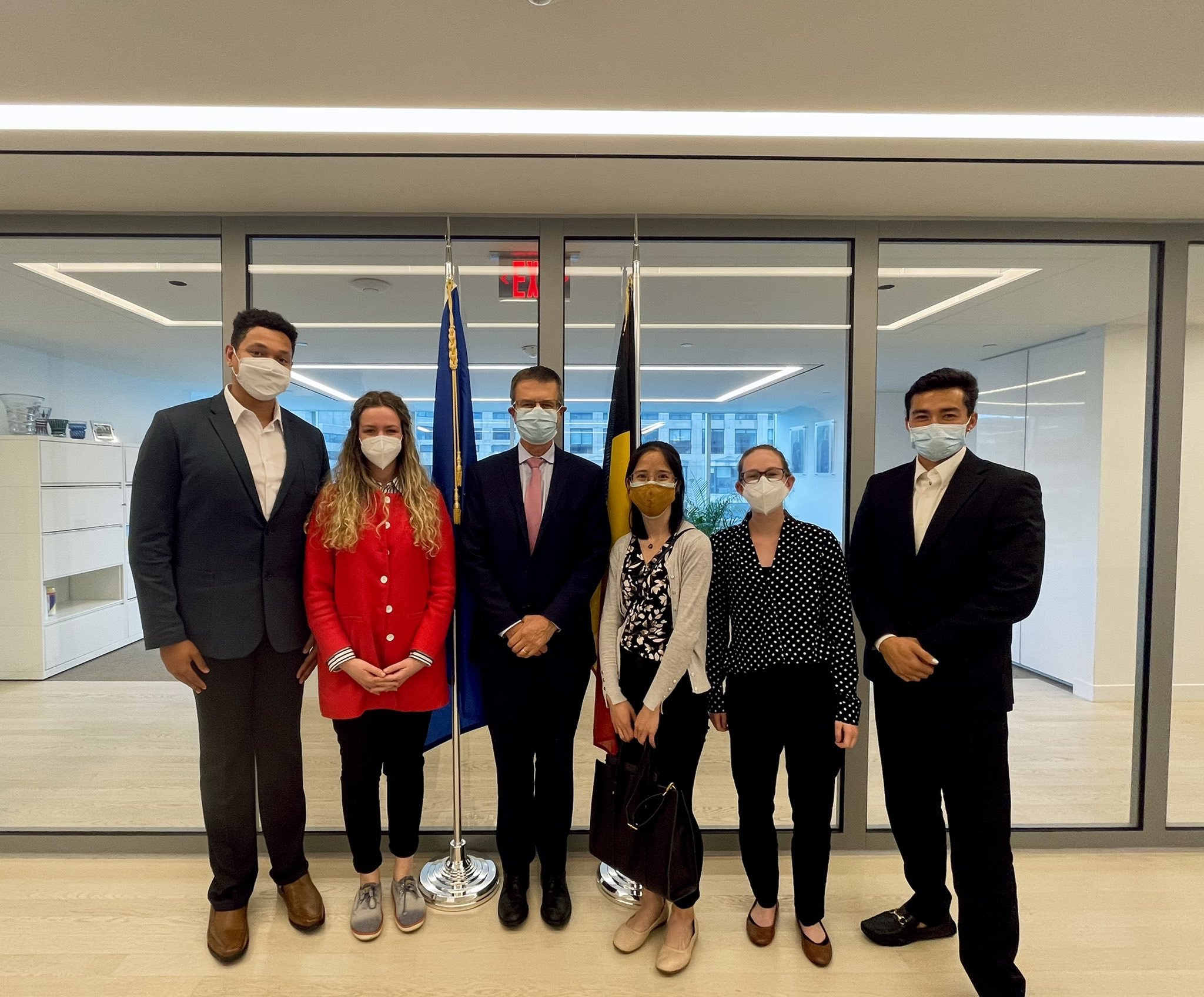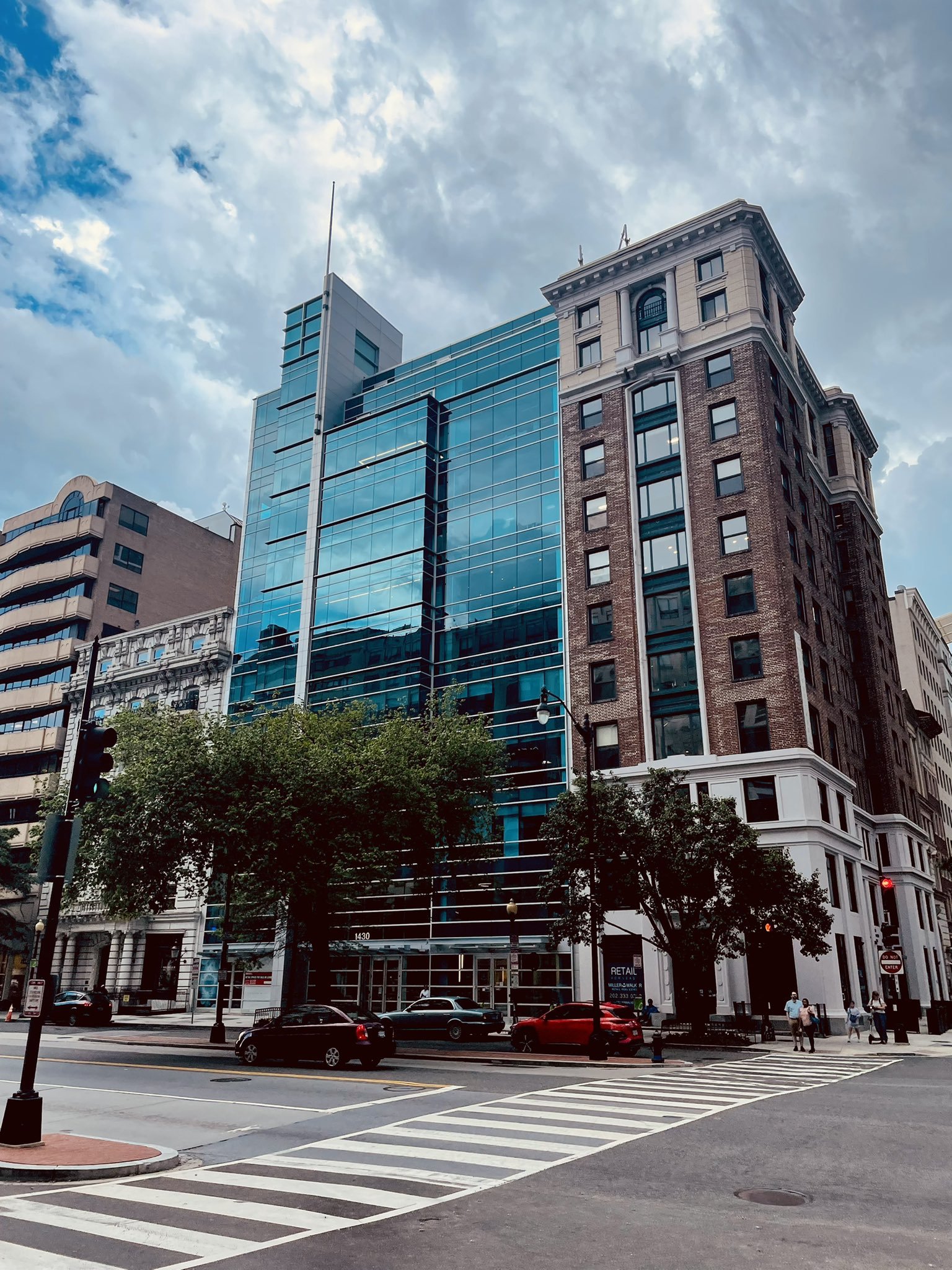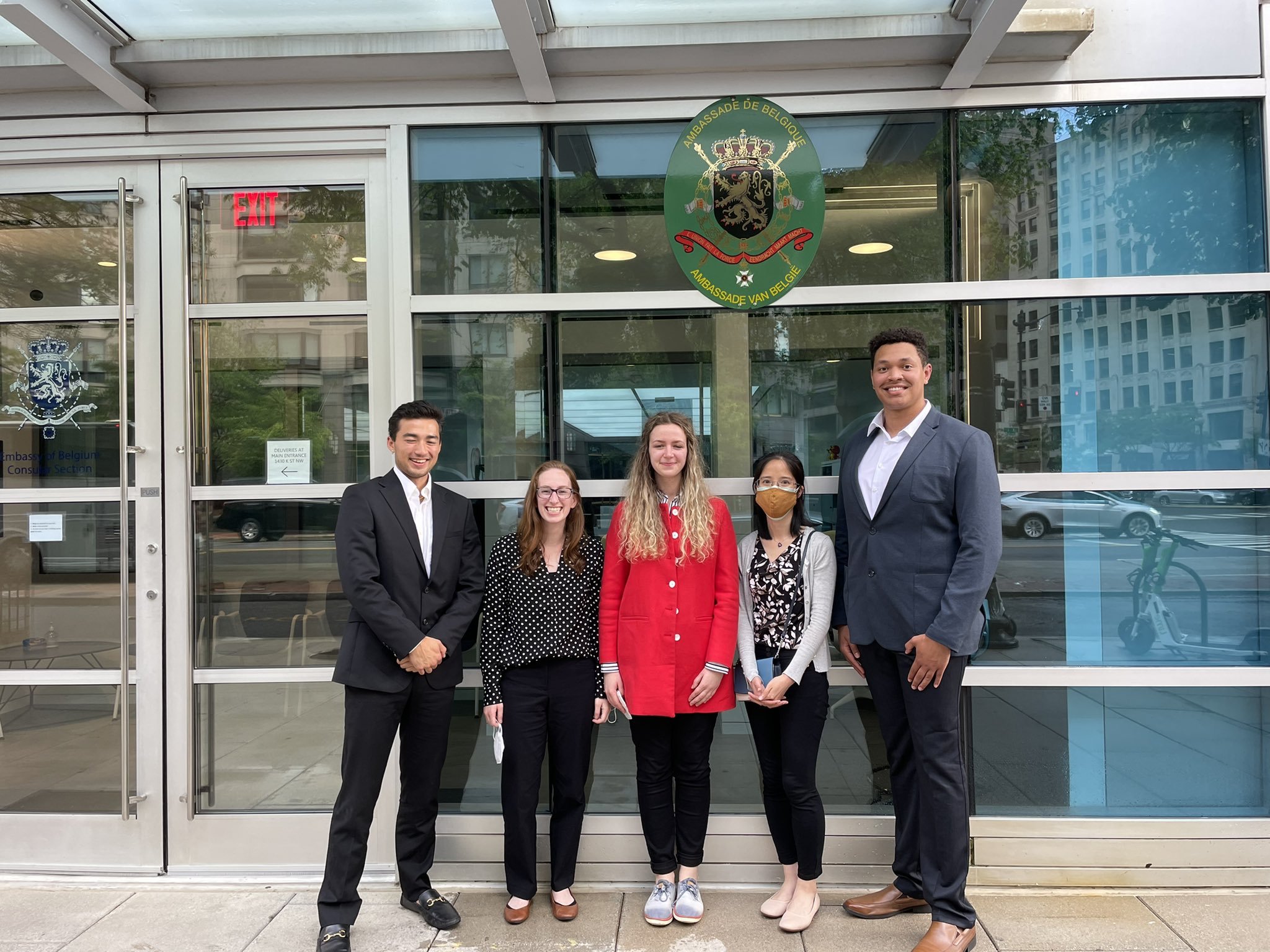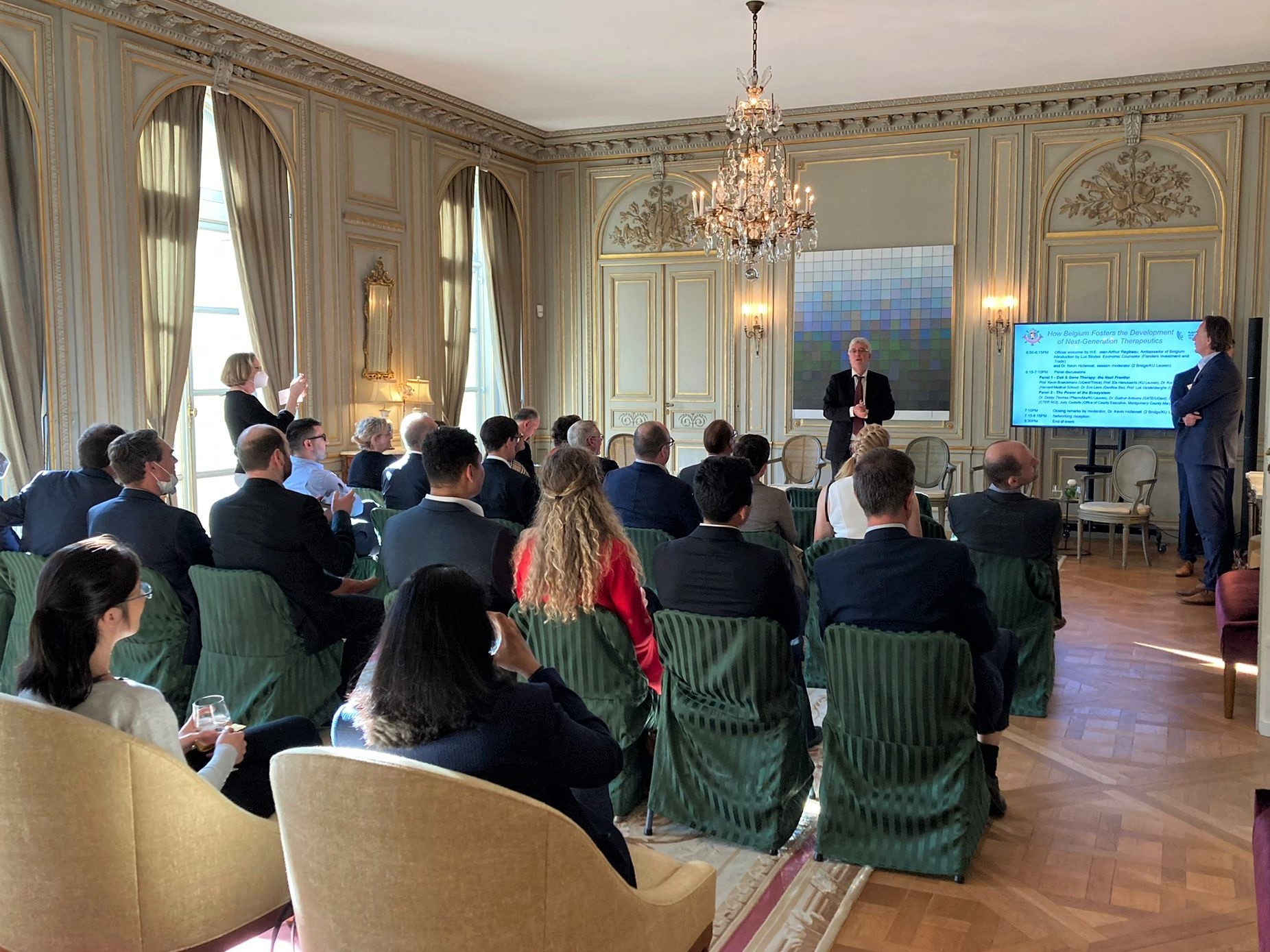“We are collaborating with institutions internationally to inform and support global policy objectives.”
Science diplomacy
When unexpected worlds meet and conversations turn to global actions
Science Diplomacy Grid Panel at the Embassy of Czechia
December 2, 2025
Vice President for Science Diplomacy Lucie Dequiedt sat on a panel discussing science diplomacy in 2025 and what lies ahead in 2026. The event was held at the Embassy of the Czechia in Washington, DC, with organization by the Science Diplomacy Grid. Lucie was a fantastic representative for early-career researchers looking to pave worldly careers in a dynamic global environment.
This also served as a fun opportunity for members of the Science Policy and Diplomacy Group to meet up with members of the Science Policy Group at UMD, building connections across Maryland!
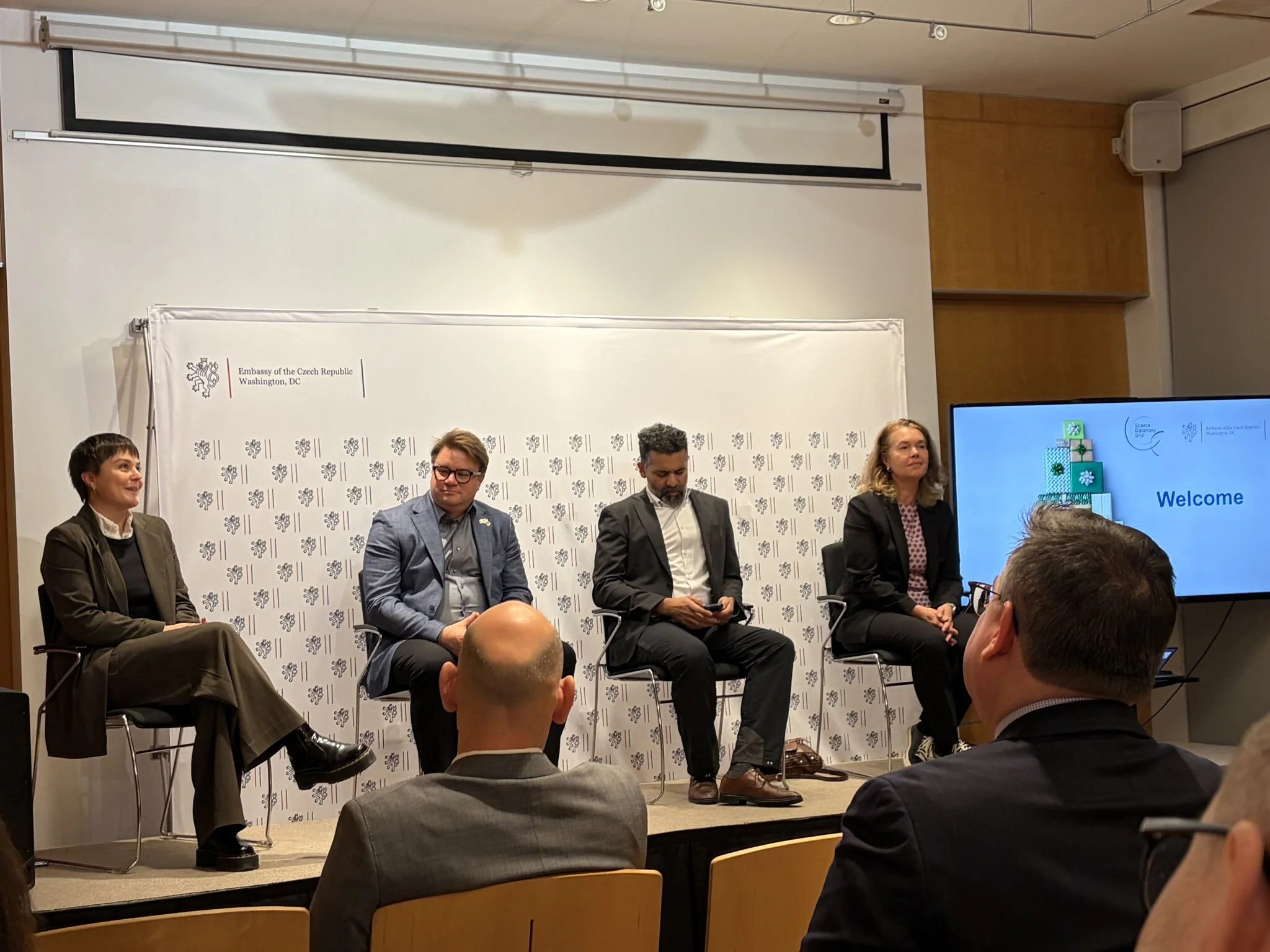
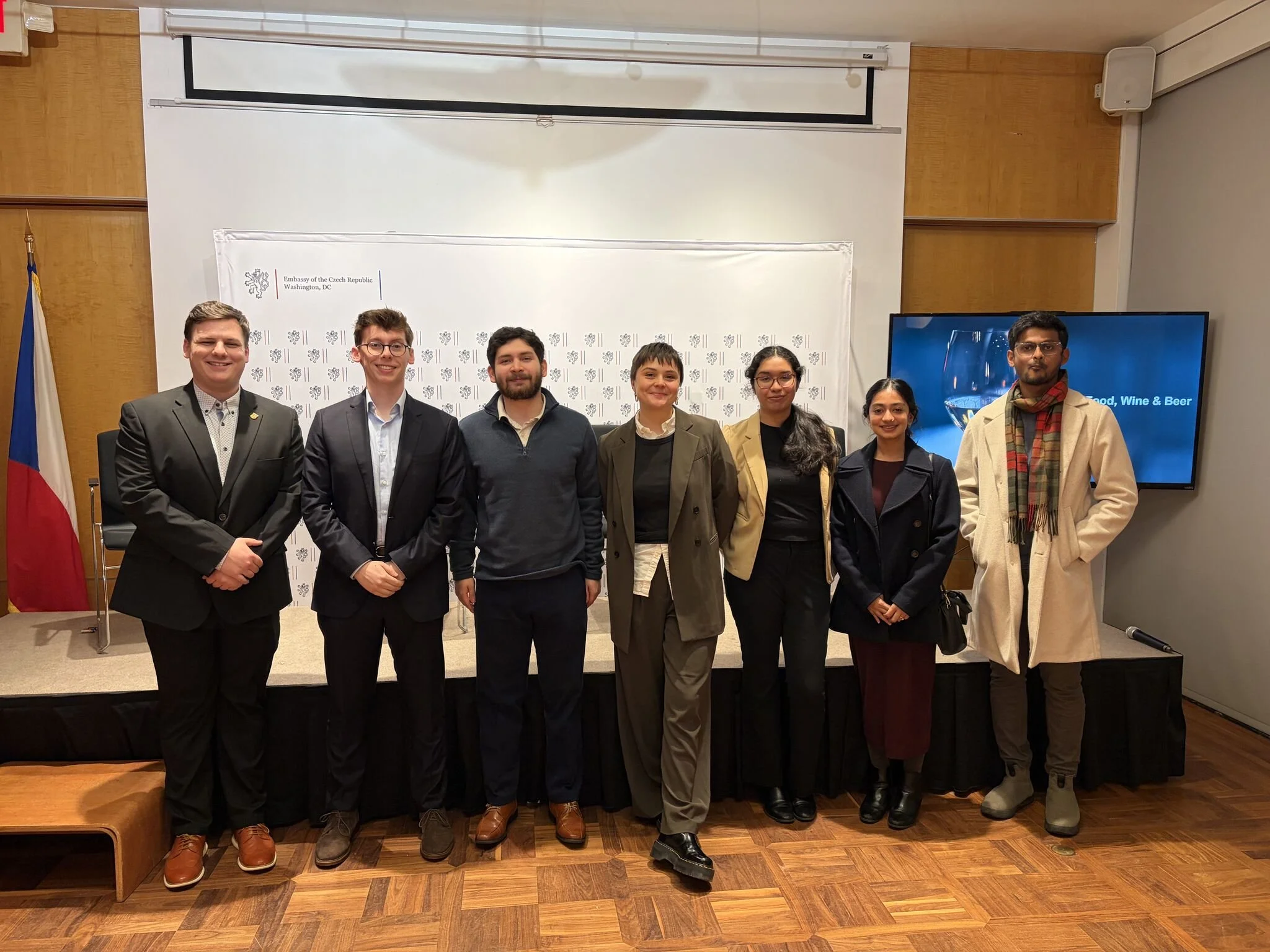
Meetups at the Embassy series: Embassy of Japan
November 10, 2025
The Science Policy and Diplomacy Group was delighted to return to the Embassy of Japan! In an event organized by Science Diplomacy Coordinator Berk Kasimcan, officials at the Embassy spoke to 50 JHU graduate students on topics including USA-Japan partnerships, Japan’s space program, nuclear energy, and more. Students were then able to ask questions and network at a reception following the talks, building relationships with other students and with embassy staff. We thank the Embassy of Japan and the wonderful officials there who helped to make this event happen.
Meetups at the Embassy series: Embassy of Australia
May 8, 2025
Organized by Vice President for Science Diplomacy Lucie Dequiedt, Johns Hopkins graduate students met with officials from the Australian Embassy to learn how Australia conducts science diplomacy with United States, Australia’s own unique perspective on science policy, the importance of international collaboration for the Australian scientific enterprise, and the key successes of and challenges facing scientific research in Australia. We thank the Embassy of Australia for their hospitality and time engaging with students in important converstations about the future of energy, natural resources, computing, data security, and pan-Pacific partnerships.
Meetups at the Embassy series: Embassy of Rwanda
September, 2024
On September 11th, 2024, the Science Diplomacy Committee of the Johns Hopkins Science Policy and Diplomacy Group (JHSPDG) organized a visit to the Embassy of Rwanda in Washington, D.C., as part of the Meetups at the Embassy series. Over 20 graduate students from Johns Hopkins’ Baltimore and D.C. campuses participated in the event. The meeting was organized by Nick Zhang, Vice President of Science Diplomacy, and Yannick Tona, Head of Political Affairs.
Rwanda, nicknamed “the land of a thousand hills,” has emerged as one of the fastest-growing innovation hubs not only in East Africa but also globally. Mr. Tona first welcomed the attendees with a warm remark, followed by a brief discussion on the history of Rwanda and how the country has evolved to position itself as a leader in science and technology (S&T) over the past decades. After this, Ona Ambrozaite, President of JHSPDG, introduced the group and shared her excitement about this unique visit to the Embassy.
Students were then given the chance to ask questions ranging from climate science to space diplomacy between the U.S. and Rwanda. Both Mr. Tona and his colleague Charles Ntageruka, Counselor of Education, provided in-depth answers and emphasized Rwanda's goal to “prioritize S&T in its national development strategy and use S&T to position itself as a leading hub in the region.”
Throughout the conversation, both Mr. Tona and Mr. Ntageruka highlighted how Rwanda prioritizes science as a driver of job creation and economic growth. The government fosters a supportive environment for innovation through effective policies that encourage investment, significantly reduce the time required to start a business, and develop technical training programs for its workforce. Kigali Innovation City (KIC)—one of the key joint ventures—co-develops and co-finances initiatives between public and private sectors, acting as a tech centre with office spaces, universities, incubators, retail, hospitality, and accommodation. KIC is designed to create an ecosystem that provides support and innovation infrastructure for tech companies and research institutions.
The event concluded with a networking opportunity, allowing attendees to engage with Embassy officials on more specific questions. This visit underscored the importance of science diplomacy in fostering international collaboration focused on sustainable development through S&T. JHSPDG appreciates the valuable opportunity that the Embassy provided to all participants, and we look forward to many more future collaborations!
Meetups at the Embassy series: Embassy of Tunisia
April, 2024
The Science Diplomacy Committee of the Johns Hopkins Science Policy and Diplomacy Group (JHSPDG) organized a visit to the Embassy of Tunisia in Washington, D.C., as part of the Meetups at the Embassy series. The event was organized by Nick Zhang, Vice President of Science Diplomacy, and Mohamed Nidhal, First Secretary of the Tunisian Embassy.
Tunisia, as the second nation to recognize the U.S. post-independence, showcases a strong commitment to science diplomacy, bridging gaps through research and innovation. First Secretary Nidhal shed light on the deep-rooted friendship between Tunisia and the U.S., spanning over 200 years. Then, he shared Tunisia's vibrant research landscape, boasting numerous labs and researchers, with a large percentage of women leading the charge. With partnerships between public and private, Tunisia has become a regional model, inspiring similar initiatives in other countries.
Instadeep, a Tunisian startup founded in 2014, grabbed attention for its groundbreaking AI technology. During the pandemic, Instadeep’s collaboration with BioNTech led to the development of the Moderna vaccine, showcasing innovation’s power in global crises. First Secretary Nidhal stressed the need to encourage youth in STEM fields and support startups.
Through programs like Erasmus and Horizon Europe, Tunisia’s strong ties with the EU highlight its alignment with European standards in emerging fields such as AI and data security. Finally, First Secretary Nidhal advised aspiring diplomats to focus on language skills and cultural understanding for effective diplomacy.
The Tunisian Embassy visit emphasized how science diplomacy fosters collaboration and understanding between nations. As Tunisia continues its journey, its commitment to science and diplomacy promises a brighter future for global partnerships and progress. JHSPDG appreciates the valuable opportunity the Embassy has provided to all student attendees and looks forward to future collaborations.
Meetups at the Embassy series: Embassy of Portugal
March 2024
The Science Diplomacy Committee of the Johns Hopkins Science Policy and Diplomacy Group (JHSPDG) recently coordinated a visit to the Embassy of Portugal in Washington, D.C., as part of the Meetups at the Embassy series.
The visit was organized and led by Corinna Torabi, JHSPDG Science Policy Coordinator; Brendon Davis, Science Policy Coordinator; Nick Zhang, VP of Science Diplomacy; and Ona Ambrozaite, President of JHSPDG.
JHSPDG was welcomed by Sandra Pires, Cultural and Education Attaché, and Maria de Jesus Espada, Agriculture and Health Attaché. The visit began with viewing of the art exhibition of Portuguese-American artist Elizabeth Casqueiro at the Embassy. After gathering in the conference room, the discussion started with opening remarks from Alexandra Bilreiro, Deputy Chief of Mission. Then, Corinna Torabi gave a brief introduction of JHSPDG as well as the group’s current projects and upcoming events.
Next, Francisco Leal de Almeida, Political Counselor, presented on domestic and diplomatic topics related to science and economy. Maria de Jesus Espada, Agriculture and Health Attaché, introduced the healthcare system and the biotechnology economy in Portugal. Finally, Sandra Pires, Cultural and Education Attaché, shared the work of several Portuguese visual, musical, and performing artists. These presentations led to a vibrant Q&A session and discussion amongst the group on healthcare, science, and cultural relations between the U.S. and Portugal. The event ended with a networking session during which we enjoyed delicious traditional Portuguese custard tart pastries!
JHSPDG is grateful to the Embassy of Portugal for providing valuable insights into Portugal-US relations, particularly collaborations on economy, culture, art, science, and technology. We encourage students to learn more about Portugal's history and opportunities to study and conduct research there, fostering stronger mutual understanding and building more cultural and scientific cooperation.
JHSPDG Seminar Series: Cybersecurity, Technology, & Diplomacy
February 2024
On Thursday, February 8, at The SAIS Bloomberg Center at 555 Pennsylvania Avenue, a panel discussion titled “Cybersecurity, Technology, & Diplomacy” was organized by Mr. Ryan Posthumus, (Science Diplomacy Coordinator of JHSPDG) and Ms. Ona Ambrozaite (President of JHSPDG, Co-director of Johns Hopkins Science Diplomacy Hub). The event featured the speakers, Ms. Meredith Burkart (Federal Bureau of Investigation), Dr. Forrest Shull (Office of the Undersecretary for Defense, Research and Engineering), and Mr. Andrew Thompson (Mandiant Intelligence).
This panel brought together industry, law enforcement, and defense officials for conversation on topics including the evolution of cyberspace, cyber escalation theory, and its implications for U.S. national security.
JHSPDG would like to thank all of the speakers’ constructive conversation on the topics of cybersecurity and diplomacy among various federal government and federal partner agencies have never been so timely and will only continue to grow in their importance.
Meetups at the Embassy series: Embassy of Egypt
January 2024
The Science Diplomacy Committee of the Johns Hopkins Science Policy and Diplomacy Group (JHSPDG) recently coordinated a visit to the Embassy of Egypt: Egyptian Cultural and Education Bureau (ECEB) in Washington, D.C., as a part of the Meetups at the Embassy series.
The visit was the first Embassy event of 2024 and was organized by Mr. Nick Zhang, Vice President of Science Diplomacy, Ms. Ona Ambrozaite, President of JHSPDG, Dr. Gihan Elhadidy, Science Diplomacy Coordinator, and Dr. Heba Saad, Director of ECEB. This event aimed to deepen understanding of Egypt’s relationship with the US, particularly in the fields of education, science, policy, and climate change. The immersive experience included a tour of the newly renovated museum, showcasing art that highlights the rich cultural heritage of Egypt.
Understanding and appreciating the cultural context, as exemplified by the tour, is vital for strengthening diplomatic relations between nations. Dr. Heba presented Egyptian currency and additional artwork before delving into the discussion on Egypt-US collaborations. A notable highlight was the USAID Centers of Excellence. This initiative pairs three leading Egyptian universities with American universities to establish centers focused on energy, water, and agriculture.
For those interested in learning more about the ECEB, it can be found here. Fullbright Fellowship is also a great opportunity which allows students to conduct research in Egypt; detailed information is available here.
JHSPDG expresses gratitude to ECEB for providing insights into the cultural significance of Egypt, including its art and cuisine. We encourage students to explore their museum, which is open to the public (appointment is required). It is advised to contact ECEB to schedule your visit: secretary@us.cdm.edu.eg
Meetups at the Embassy series: Embassy of India
December 2023
The Science Diplomacy Committee of the Johns Hopkins Science Policy and Diplomacy Group (JHSPDG) organized a visit to the Embassy of India in Washington, D.C., as part of the Meetups at the Embassy series.
The visit was organized by Mr. Nick Zhang, Vice President of Science Diplomacy, Ms. Ona Ambrozaite, President of JHSPDG, Ms. Aditi Walunj, First Secretary - Education, Science, and Technology, and Dr. Vijayabaskar Narayanamurthy, Counsellor - Defense Science and Technology. This event aimed to deepen understanding of India's relationship with the U.S., particularly in the fields of education, economy, as well as science & technology.
The event started with a welcome remark from Ambassador Sripriya Ranganathan, Deputy Chief of Mission. She introduced the Embassy's goals and emphasized the deep cooperation between India and the U.S. on artificial intelligence, quantum science, and climate. Then, Ms. Ona Ambrozaite gave a presentation about the JHSPDG's past projects as well as an overview of Science Policy and Diplomacy. After that, Dr. Vinod Bahade - Counsellor of Economics, Mr. Krunaj Joshi - Counsellor of Space, Mr. Vivek Chaudhary - First Secretary of Economics, and Ms. Aditi Walunj continued the presentation–topics ranging from economic opportunities between India-US to on-going space collaborations.
India and the United States have enjoyed close relations with extensive trade, defense, education, and technology collaborations. Understanding and appreciating the cultural context, as exemplified by all the presentations, is critical for strengthening diplomatic relations between the two nations. This event ended with Q&A and networking sessions over some traditional Indian snacks.
JHSPDG is grateful to the Embassy of India for providing valuable insights into India-US diplomacy, particularly in science and technology collaborations. We encourage students to explore many study and research opportunities in India, fostering stronger mutual understanding and building more science cooperation.
Meetups at the Embassy series: Embassy of Brazil
October 2023
The Science Diplomacy Committee of the Johns Hopkins Science Policy and Diplomacy Group (JHSPDG) organized a visit to the Embassy of Brazil in Washington, D.C., as part of the Meetups at the Embassy series.
The event was organized by Ms. Vivian Su, Vice President of Science Policy, Counselor Iberê Uchoa de Azevedo Barbosa, Head of the Science, Technology and Innovation Sector, and Secretary Paulo Cezar Rotella Braga. Graduate students from the Homewood, East Baltimore, and Washington, D.C., campuses were invited to attend.
During the science diplomacy dialogue, Counselor Barbosa delivered an overview of the ongoing collaborations between Brazil and the US, followed by a Q&A session with the JHU graduate students. Collaborations between the two countries, such as remote sensing projects in the Amazon region, drew interest from students looking to pursue research opportunities in Brazil. The recent partnership between the US National Science Foundation (NSF) and the São Paulo Research Foundation (FAPESP) was also highlighted, which aims to support research through bilateral activities between US and Brazil. Additionally, students learned about opportunities to spend time in Brazil, such as through the FAPESP-Fulbright Cooperative Program for Visiting Professors and Researchers. We also learned that reconvening of the Brazil-US Joint Commission on Science and Technology, which had last met in 2020, has the potential to strengthen the strong relationship between the two countries.
JHSPDG extends a heartfelt appreciation to the Embassy of Brazil for their support in ensuring the success of this Meetups at the Embassy series: Embassy of Brazil event. The participation of all attendees provided valuable perspectives and contributed to an insightful and fruitful event. Obrigado!
Meetups at the Embassy series: Embassy of Japan
September 2023
The Science Diplomacy Committee of the Johns Hopkins Science Policy and Diplomacy Group (JHSPDG) organized the Meetups at the Embassy series: Embassy of Japan event in Washington, D.C., on a sunny Friday, September 22, 2023.
The event was organized by Ms. Ona Ambrozaite, JHSPDG President, Mr. Nick Zhang, Science Diplomacy Coordinator, and Mr. Keisuke Okamura, First Secretary of the Embassy of Japan (EoJ). Forty-two graduate students from Johns Hopkins School of Advanced International Studies (SAIS), Whiting School of Engineering (WSE), Krieger School of Arts & Sciences (KSAS), and School of Medicine attended the event.
The event was hosted at the historic Old Residence at the Embassy, surrounded by landscaped gardens and a teahouse, celebrating the fruitful history of the U.S.-Japan diplomatic relationship. The conversation started with warm welcome remarks from Mr. Koji Aribayashi, Counsellor of the Science Section, followed by Ms. Ona Ambrozaite’s introduction of the past and ongoing projects of JHSPDG. Next, Ms. Margery Weidman from the Japan Exchange and Teaching (JET) Program talked about the opportunity for U.S. students to teach English or intern at the local Japanese government agencies in Japan. After that, Counsellor Aribayashi provided an overview of the past and current U.S.-Japan science and technology cooperations and diplomatic efforts to ensure productive relations between the two countries.
Mr. Yutaka Kadoya and Ms. Mikiko Ojima, Nuclear Attachés from the Science Section of the EoJ, introduced the current Nuclear Diplomacy projects. Their presentation was followed by an update on the Space Diplomacy efforts at the Embassy, presented by Mr. Shinichiro Narita, the EoJ Space Attaché. Lastly, Mr. Keisuke Okamura shared more details on the topic of Science Diplomacy between the U.S. and Japan with lots of thoughtful insights.
After the talks, attendees had the opportunity to network over refreshments and snacks, including Onigiri—traditional Japanese rice ball snacks. The event concluded with Q&A discussions with representatives from the Science Section along with Mr. Kyotaro Maeda, Director of the North America Center of the Japanese National Institute of Information and Technology (NICT), and Ms. Miho Yasuda, International Program Associate from the Japan Society for the Promotion of Science (JSPS).
JHSPDG would like to thank all the representatives from the Embassy of Japan for making our Meetups at the Embassy series: Embassy of Japan event a huge success. We also want to express our appreciation for all the attendees’ participation and their unique insights, thoughtful questions, and engaging conversations during and after the event.
Alternative Protein Manufacturing Panel at the Embassy of Israel
April 2023
The Science Diplomacy Committee of the Johns Hopkins Science Policy and Diplomacy Group (JHSPDG) and the Embassy of Israel hosted a panel discussion on the topic of alternative protein manufacturing.
The Embassy of Israel and the Science Diplomacy Committee of JHSPDG hosted a panel discussion focusing on alternative protein manufacturing. The panel included experts within the field: Mr. Kevin Benmoussa, Executive VP and Chief Financial Officer at Aleph Farms, Dr. Jochen Mueller, Assistant Professor in the Department of Civil and Systems Engineering at Johns Hopkins University and Co-Founder of Mooji Meats Inc., and Dr. Lauren Blake, Co-Founder of the Alternative Protein Project at Johns Hopkins. Moderated by Ms. Vivian Su, JHSPDG Science Diplomacy Coordinator, the panel discussion included an overview of the science and technology within the alternative protein manufacturing field, the purpose of alternative proteins, and global partnerships to advance the change in food systems.
Each panelist offered a unique viewpoint while discussing the current challenges and limitations within the field. Education, funding, and consumer adoption were brought up throughout the discussion. It was emphasized that alternative protein manufacturing is a national prioritization for both countries, and the conversation concluded with ideas for collaborations between the US and Israel to promote sustainable food systems.
Meetups at the Embassy series: Taipei Economic and Cultural Representative Office
April 2023
The second visit of the Johns Hopkins Science Policy and Diplomacy Group’s (JHSPDG) newly launched Meetups at the Embassy series was held at the Taipei Economic and Cultural Representative Office (TECRO) in Washington, D.C., and was organized by Ms. Vivian Su, JHSPDG Science Diplomacy Coordinator and Mr. Scott Chang, Senior Science and Technology Officer of TECRO.
The event was hosted at the Twin Oaks Estate, a historical landmark that has hosted US presidential figures and houses a number of priceless antiques. After a tour of the mansion, Mr. Robin J.C. Cheng, Deputy Representative of TECRO, and Ms. Ona Ambrozaite, JHSPDG Science Diplomacy Chair, delivered opening remarks. Ms. Shirley Yang, Director of the Science and Technology Division, presented Taiwan-US cooperation, which included the Cancer Moonshot and Advanced Semiconductor Chip Programs. Mr. Frances Feng, Executive Officer of the Political Division, discussed geopolitical relations with other countries and the current state of Taiwan’s global affairs. Mr. Aaron Chen, Director of the Education Division, introduced fellowships and resources for students to spend time in Taiwan. There was also an engaging discussion between Johns Hopkins attendees and TECRO representatives about Taiwan’s strategies to strengthen diplomatic relations with other countries as well as global science and technology initiatives.
We would like to deeply express our gratitude to Mr. Chang, Mr. Cheng, Ms. Yang, Mr. Feng, Mr. Chen, and TECRO for their hospitality and engagement in the Science & Technology Diplomacy dialogue. We would also like to thank our attendees, which included JHU graduate students across all campuses and Dr. David Keegan from the Chinese Studies Program at Johns Hopkins School of Advanced International Studies (SAIS), for participating and providing unique insights during the discussion.
Social Design Thinking Competition at the Embassy of Switzerland on the occasion of Women’s History Month
March 2023
On March 31st, the Embassy of Switzerland hosted its first Social Design Thinking Competition to commemorate Women’s History Month. Among the competing groups, the Johns Hopkins team emerged victorious in pitching an innovative solution to destigmatize menstruation and promote inclusive menstrual education. The JHU team's proposal aimed to remove social and economic barriers to menstrual education and provide education on available menstrual products.
The team members, Ms. Ona Ambrozaite, Ms. Danielle Nicklas, Ms. Clarissa Ren, and Ms. Vivian Su were thrilled to have won the competition. They chose to focus on human-centered needs and came up with a proposal that would directly benefit menstruating individuals. The team's proposal was particularly compelling because of its emphasis on inclusivity, which could help reduce the social stigma associated with menstruation.
The team expressed their gratitude to the Embassy of Switzerland for this opportunity to showcase their creativity and innovation. They felt that the competition was an incredible experience as they had to put their heads together to come up with a proposal that would benefit the larger community. Their work highlighted the importance of quality menstrual education in promoting inclusivity and reducing social and economic disparities.
Overall, the Social Design Thinking Competition was a great success, and the winning team's proposal has the potential to make a positive impact in the menstrual health space.
Congratulations to the team for their outstanding work and to the Embassy of Switzerland for organizing such an important event!
Johns Hopkins University Winning Team (from left):
Ms. Clarissa Ren
Ms. Ona Ambrozaite
Ms. Vivian Su
Ms. Danielle Nicklas
Meetups at the Embassy series: Embassy of the Republic of Singapore
March 2023
The Science Diplomacy Committee of the Johns Hopkins Science Policy and Diplomacy Group is very happy to announce the launch of the Meetups at the Embassy series, led by Ms. Ona Ambrozaite, Science Diplomacy Chair, Ms. Vivian Su and Mr. Nick Zhang, Science Diplomacy Coordinators, and Mr. Dezmond Cole, President.
The first Meetups at the Embassy series event occurred at the Embassy of the Republic of Singapore in Washington, D.C., organized by Mr. Zhang and representatives from the Embassy.
Ms. Karyn Chan (First Secretary-Political) and Ms. Rachel Lim (Second Secretary-Political) from the Embassy participated in a collaborative discussion with graduate students from different divisions of the Johns Hopkins University: Homewood Campus, East Baltimore Campus and the School of Advanced International Studies (SAIS).
During the open conversation, Ms. Lim first gave a brief introduction to Singapore’s history and its unique geographic location in Southeast Asia. Ms. Lim also emphasized Singapore’s strategic multilateral collaborations with other nations and its vital role in the Association of Southeast Asian Nations (ASEAN).
Then, attendees discussed Singapore’s plans for mitigating the threat of the rising sea levels and implementing carbon taxation and decarbonization technologies. Ms. Chan discussed Singapore’s role as a leader in science and technology, providing unique insights into how Singapore tackles climate-induced public health issues as well as emerging infectious diseases. The conversation concluded with hearing more about Singapore’s future decarbonization strategies and international collaborations to build a more resilient and sustainable future.
In summary, the engaging and fruitful discussion demonstrated the power of science diplomacy to connect young scientists interested in international issues with career diplomats focusing on science and technology topics. We would like to give our sincere appreciation to Ms. Lim, Ms. Chan and the Embassy of the Republic of Singapore for hosting us and engaging in the science diplomacy dialogue. We would also like to thank all the attendees for providing their unique perspectives on how science diplomacy can help mitigate issues in the sectors of climate science and public health.
Science & Technology Diplomacy Dialogue at the Embassy of Japan
March 2023
The Science Diplomacy Committee of the Johns Hopkins Science Policy and Diplomacy Group (JHSPDG) was invited to a Science & Technology Diplomacy dialogue hosted by the Embassy of Japan.
The collaborative discussion was joined by members of the Embassy of Japan, National Institute of Science and Technology Policy (NISTEP), Japan Society for the Promotion of Science (JSPS), Japan Science and Technology Agency (JST), Japan Agency for Medical Research and Development (AMED), and Ministry of Foreign Affairs of Japan (MOFA). The JHSPDG was also joined by the distinguished Johns Hopkins faculty Prof. Peter Agre from the Bloomberg School of Public Health and School of Medicine and Prof. Kotaro Shiojiri from the School of Advanced International Studies.
The discussion was commenced by Ms. Ona Ambrozaite, JHSPDG Science Diplomacy Chair, who introduced the launch of science diplomacy at Jobhns Hopkins, the organization’s goals, previous and ongoing projects and collaborations as well as the Johns Hopkins science diplomacy agenda for the coming year.
Prof. Peter Agre, Bloomberg Distinguished Professor and Nobel Laureate in Chemistry, presented his experiences with science diplomacy in North Korea. He provided insights on how science can bridge countries despite rising tensions.
The conversation was followed by an overview of NISTEP’s mission, research activities, and foresights. Led by Mr. Koji Saeki, Director General, Dr. Yasuhiro Ogura, Senior Researcher, and Dr. Kensei Kitajima, Research Fellow, there was an engaging discourse about evidence-based policy making and promotion of greater participation of science and technology experts in Japan’s policymaking.
The Science & Technology Diplomacy dialogue captured the essence of science diplomacy as representatives of different organizations came together to help advance the future of science on a global scale. As early-career researchers, we are very encouraged to have the support of the Embassy and look forward to our upcoming collaborations, including a potential partnership between JHSPDG and the Embassy of Japan on space activities in the near future.
We would like to give our deepest gratitude to Dr. Keisuke Okamura, First Secretary of the Embassy of Japan, for helping to organize and host the dialogue. We would also like to thank all the attendees for providing their insights and experiences and look forward to even more such strong partnerships in the future.
Collaboration with the Japan Society for the Promotion of Science (JSPS) and the Embassy of Japan
January 2023
The Science Diplomacy Committee of the Johns Hopkins Science Policy and Diplomacy Group (JHSPDG) hosted an in-person seminar on January 20th on the JHU Homewood campus.
The first seminar of 2023 featured Ms. Arisu Wada, Deputy Director, Ms. Yuki Kihara, International Program Associate, Ms. Yumi Sakai, International Program Associate, and Mr. Takefumi Yamaguchi, International Program Associate from the Japan Society for the Promotion of Science (JSPS) Washington Office. The JSPS team presented the Office’s mission, activities, and opportunities for early career researchers to study and conduct research in Japan.
Mr. Taichi Kaneshiro, Counselor for Education for the Embassy of Japan in the United States in Washington, D.C., presented information about the Japanese Government (Monbukagakusho:MEXT) Scholarships as well.
The information sessions were followed by an engaging panel discussion with former JSPS fellows who currently work at Johns Hopkins:
· Professor Kit Bowen (Department of Chemistry)
· Professor Peter Armitage (Department of Physics and Astronomy)
· Dr. Stephanie Rankin-Turner (Department of Molecular Microbiology & Immunology, Postdoctoral Fellow)
· Dr. Saed Abbasi (Johns Hopkins School of Medicine, Postdoctoral Fellow)
The seminar proved to be a vey engaging and well-attended event, with trainees learning about the JSPS fellowship and ways to find a host researcher in Japan, how the fellowship experience in Japan has helped the fellows’ current research/career, and what is attractive about the JSPS program compared to other fellowship programs.
Arigato to our wonderful guests and those who attended!
Collaboration with the Embassy of France
October 2022
The Science Diplomacy Committee of the Johns Hopkins Science Policy Group (JHSPG), led by Ona Ambrozaite, the Science Diplomacy Chair, hosted a hybrid seminar on October 28th on the JHU Homewood campus. The second seminar of the year featured Dr. Mireille Guyader, Counselor for Science and Technology for the Embassy of France in the United States in Washington, D.C.
Dr. Guyader spoke on the Science Office’s mission, activities, and opportunities for early career researchers to study and conduct research in France. With the support from the NSPN Chapter Development Fund, we extended invitations to trainees nationwide. One opportunity that Dr. Guyader highlighted was the Chateaubriand Fellowship, which allows U.S. Ph.D. students in STEM to work for 4 – 9 months in a French collaborator's laboratory. Following the seminar was a reception that facilitated networking between the attendees and staff from the Office for Science and Technology at the Embassy of France.
The seminar proved to be an enlightening event, with trainees learning about bilateral research collaborations between France and the U.S., as well as some of the many wonderful opportunities in the science diplomacy space.
Seminar by the Science Office of the Embassy of Switzerland
August 2022
The Science Diplomacy Committee of the Johns Hopkins Science Policy Group (JHSPG) hosted a hybrid seminar on August 5th on the JHU School of Medicine campus. The first hybrid seminar of the year featured Dr. Tracy Dove, the Scientific Advisor at the Science Section, and Maxime Sapin, the Academic Associate at the Science Section, of the Embassy of Switzerland in Washington, D.C. They gave a talk about the Science Office’s mission, activities, and the Swissnex network.
Participants both in-person and online enjoyed the seminar that featured information about what Switzerland is most known for, how the country funds scientific research, and how researchers in the U.S. and Canadian institutions can apply for scholarships to study in Switzerland. The participants reflected that the “information was provided in a very engaging manner” and that they look forward to “more events with multiple stakeholders to engage and connect with”.
Collaboration with the Embassy of Belgium and Ghent University
January 2022 - Present
The JHSPDG Science Diplomacy Committee collaborated with the Embassy of Belgium and Ghent University to address the issue of herbicide reduction in the U.S. Over a >1 year-long science diplomacy project, we met with the university on a regular basis to write a policy analysis advocating for specific policy amendments, which we then submitted for publication in the Journal of Science Policy & Governance.
Update June 26, 2023
✍ 🌎 Our first science diplomacy publication is out: link HERE
Subnational diplomacy: collaboration between the Johns Hopkins Science Policy and Diplomacy Group and Ghent University scholars on a sustainable agriculture-focused publication in the Journal of Science Policy & Governance (JSPG) Special Topics Issue of 2023, on Development Policy and Global Change Science to Achieve the Vision of Sustainable Americas
👉 Global pesticide use has nearly doubled since 1990, with the market expected to reach $130 billion by 2023, driven by the need to increase crop yields for a growing world population.
👉 Concerns about the impact of pesticides on ecosystems have led to increased focus on sustainable agricultural practices.
👉 This policy analysis compares the regulation systems for pesticide use in the US and the EU, explores case studies from Washington State and Belgium, and suggests opportunities for policy improvements and transatlantic cooperation.
🥂 Thank you to the rest of the team for joining such a research journey and making a >1 year-long science diplomacy project such an enriching success for all authors involved.



